Major Attributes of EU Law and English Legal System
VerifiedAdded on 2023/01/09
|20
|7828
|70
AI Summary
This report analyzes the major attributes of EU law and the English legal system, including statutory interpretations, differences between criminal and civil law, the creation of EU law and its impact on the UK, and the features of the English legal system.
Contribute Materials
Your contribution can guide someone’s learning journey. Share your
documents today.
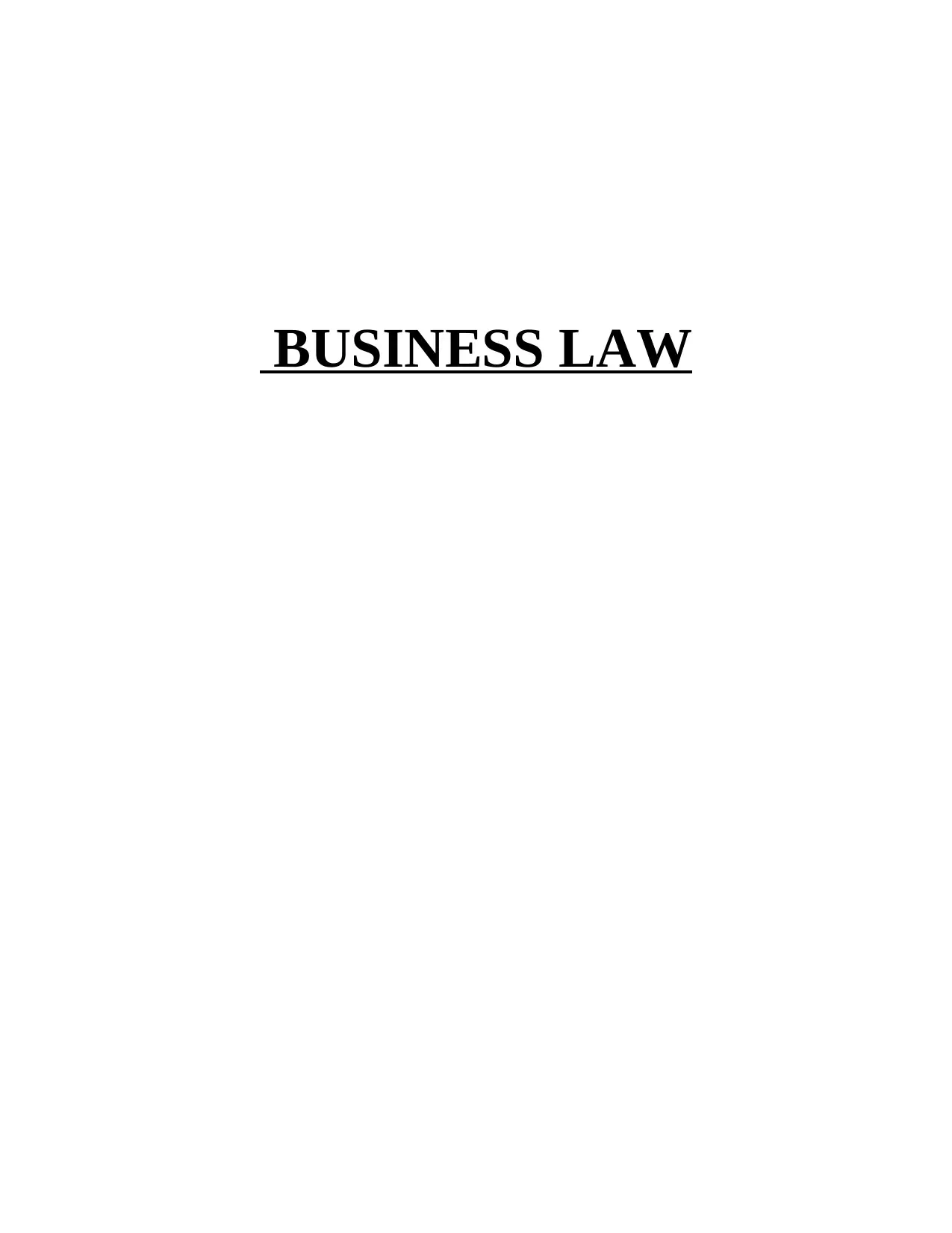
BUSINESS LAW
Secure Best Marks with AI Grader
Need help grading? Try our AI Grader for instant feedback on your assignments.
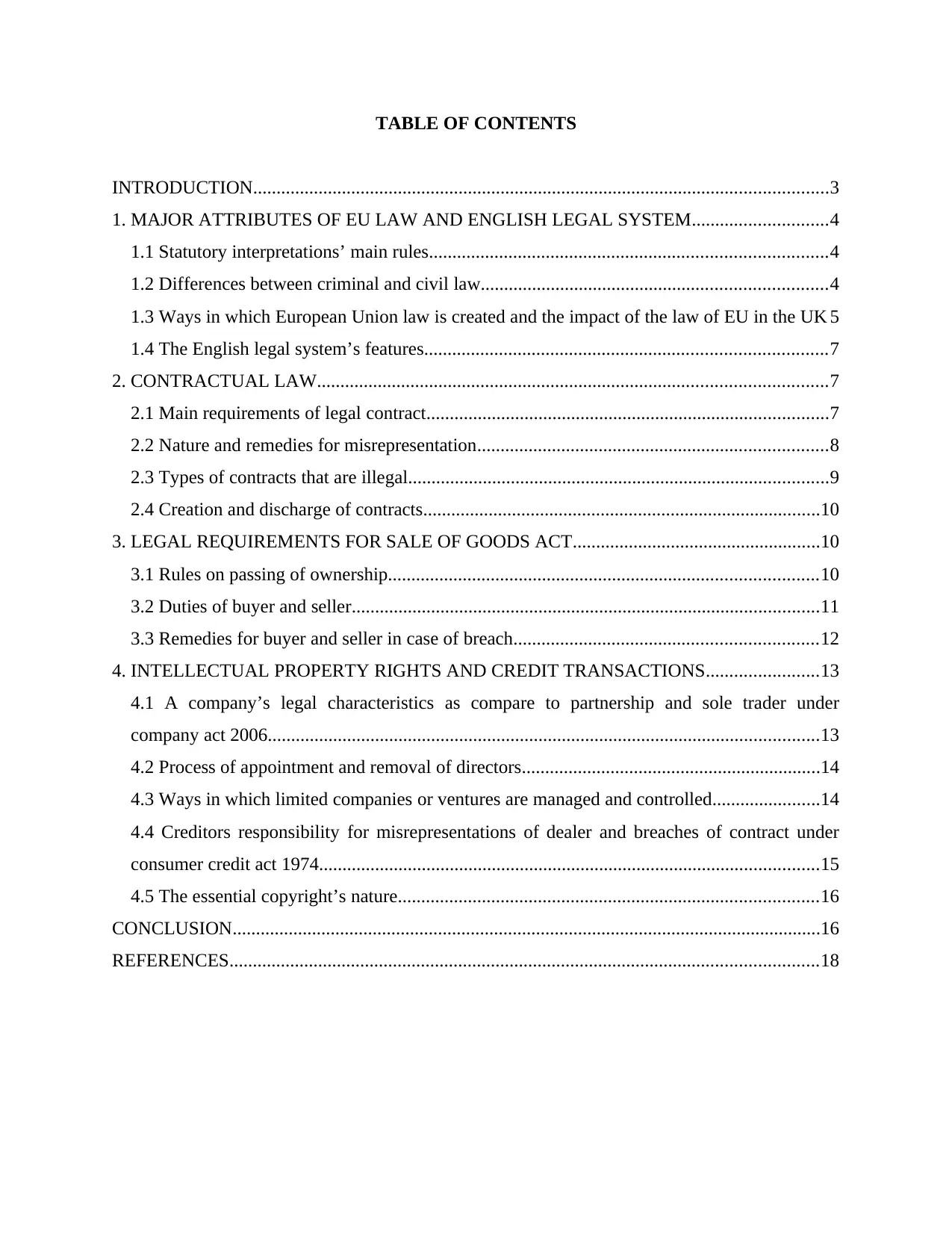
TABLE OF CONTENTS
INTRODUCTION...........................................................................................................................3
1. MAJOR ATTRIBUTES OF EU LAW AND ENGLISH LEGAL SYSTEM.............................4
1.1 Statutory interpretations’ main rules.....................................................................................4
1.2 Differences between criminal and civil law..........................................................................4
1.3 Ways in which European Union law is created and the impact of the law of EU in the UK 5
1.4 The English legal system’s features......................................................................................7
2. CONTRACTUAL LAW.............................................................................................................7
2.1 Main requirements of legal contract......................................................................................7
2.2 Nature and remedies for misrepresentation...........................................................................8
2.3 Types of contracts that are illegal..........................................................................................9
2.4 Creation and discharge of contracts.....................................................................................10
3. LEGAL REQUIREMENTS FOR SALE OF GOODS ACT.....................................................10
3.1 Rules on passing of ownership............................................................................................10
3.2 Duties of buyer and seller....................................................................................................11
3.3 Remedies for buyer and seller in case of breach.................................................................12
4. INTELLECTUAL PROPERTY RIGHTS AND CREDIT TRANSACTIONS........................13
4.1 A company’s legal characteristics as compare to partnership and sole trader under
company act 2006......................................................................................................................13
4.2 Process of appointment and removal of directors................................................................14
4.3 Ways in which limited companies or ventures are managed and controlled.......................14
4.4 Creditors responsibility for misrepresentations of dealer and breaches of contract under
consumer credit act 1974...........................................................................................................15
4.5 The essential copyright’s nature..........................................................................................16
CONCLUSION..............................................................................................................................16
REFERENCES..............................................................................................................................18
INTRODUCTION...........................................................................................................................3
1. MAJOR ATTRIBUTES OF EU LAW AND ENGLISH LEGAL SYSTEM.............................4
1.1 Statutory interpretations’ main rules.....................................................................................4
1.2 Differences between criminal and civil law..........................................................................4
1.3 Ways in which European Union law is created and the impact of the law of EU in the UK 5
1.4 The English legal system’s features......................................................................................7
2. CONTRACTUAL LAW.............................................................................................................7
2.1 Main requirements of legal contract......................................................................................7
2.2 Nature and remedies for misrepresentation...........................................................................8
2.3 Types of contracts that are illegal..........................................................................................9
2.4 Creation and discharge of contracts.....................................................................................10
3. LEGAL REQUIREMENTS FOR SALE OF GOODS ACT.....................................................10
3.1 Rules on passing of ownership............................................................................................10
3.2 Duties of buyer and seller....................................................................................................11
3.3 Remedies for buyer and seller in case of breach.................................................................12
4. INTELLECTUAL PROPERTY RIGHTS AND CREDIT TRANSACTIONS........................13
4.1 A company’s legal characteristics as compare to partnership and sole trader under
company act 2006......................................................................................................................13
4.2 Process of appointment and removal of directors................................................................14
4.3 Ways in which limited companies or ventures are managed and controlled.......................14
4.4 Creditors responsibility for misrepresentations of dealer and breaches of contract under
consumer credit act 1974...........................................................................................................15
4.5 The essential copyright’s nature..........................................................................................16
CONCLUSION..............................................................................................................................16
REFERENCES..............................................................................................................................18
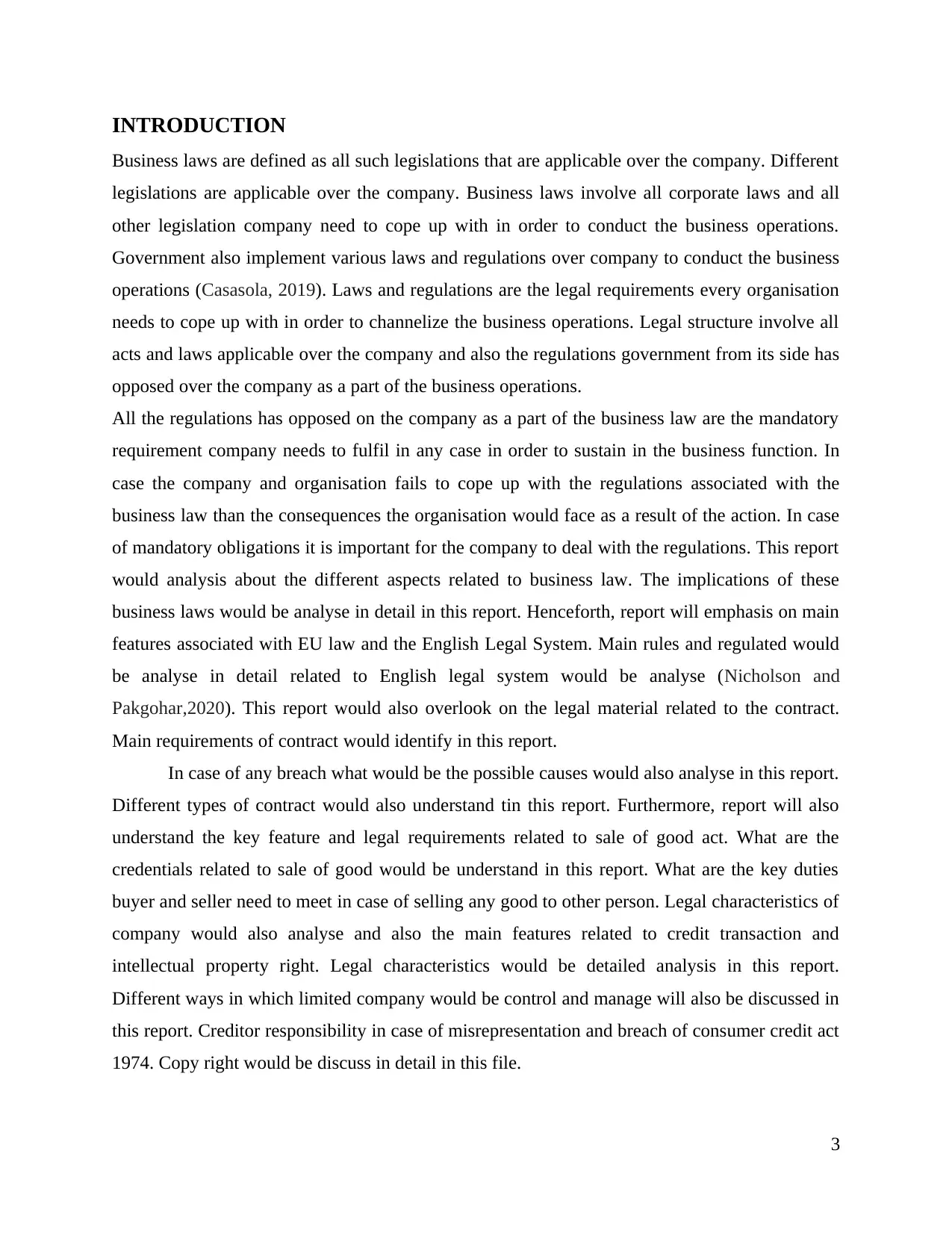
INTRODUCTION
Business laws are defined as all such legislations that are applicable over the company. Different
legislations are applicable over the company. Business laws involve all corporate laws and all
other legislation company need to cope up with in order to conduct the business operations.
Government also implement various laws and regulations over company to conduct the business
operations (Casasola, 2019). Laws and regulations are the legal requirements every organisation
needs to cope up with in order to channelize the business operations. Legal structure involve all
acts and laws applicable over the company and also the regulations government from its side has
opposed over the company as a part of the business operations.
All the regulations has opposed on the company as a part of the business law are the mandatory
requirement company needs to fulfil in any case in order to sustain in the business function. In
case the company and organisation fails to cope up with the regulations associated with the
business law than the consequences the organisation would face as a result of the action. In case
of mandatory obligations it is important for the company to deal with the regulations. This report
would analysis about the different aspects related to business law. The implications of these
business laws would be analyse in detail in this report. Henceforth, report will emphasis on main
features associated with EU law and the English Legal System. Main rules and regulated would
be analyse in detail related to English legal system would be analyse (Nicholson and
Pakgohar,2020). This report would also overlook on the legal material related to the contract.
Main requirements of contract would identify in this report.
In case of any breach what would be the possible causes would also analyse in this report.
Different types of contract would also understand tin this report. Furthermore, report will also
understand the key feature and legal requirements related to sale of good act. What are the
credentials related to sale of good would be understand in this report. What are the key duties
buyer and seller need to meet in case of selling any good to other person. Legal characteristics of
company would also analyse and also the main features related to credit transaction and
intellectual property right. Legal characteristics would be detailed analysis in this report.
Different ways in which limited company would be control and manage will also be discussed in
this report. Creditor responsibility in case of misrepresentation and breach of consumer credit act
1974. Copy right would be discuss in detail in this file.
3
Business laws are defined as all such legislations that are applicable over the company. Different
legislations are applicable over the company. Business laws involve all corporate laws and all
other legislation company need to cope up with in order to conduct the business operations.
Government also implement various laws and regulations over company to conduct the business
operations (Casasola, 2019). Laws and regulations are the legal requirements every organisation
needs to cope up with in order to channelize the business operations. Legal structure involve all
acts and laws applicable over the company and also the regulations government from its side has
opposed over the company as a part of the business operations.
All the regulations has opposed on the company as a part of the business law are the mandatory
requirement company needs to fulfil in any case in order to sustain in the business function. In
case the company and organisation fails to cope up with the regulations associated with the
business law than the consequences the organisation would face as a result of the action. In case
of mandatory obligations it is important for the company to deal with the regulations. This report
would analysis about the different aspects related to business law. The implications of these
business laws would be analyse in detail in this report. Henceforth, report will emphasis on main
features associated with EU law and the English Legal System. Main rules and regulated would
be analyse in detail related to English legal system would be analyse (Nicholson and
Pakgohar,2020). This report would also overlook on the legal material related to the contract.
Main requirements of contract would identify in this report.
In case of any breach what would be the possible causes would also analyse in this report.
Different types of contract would also understand tin this report. Furthermore, report will also
understand the key feature and legal requirements related to sale of good act. What are the
credentials related to sale of good would be understand in this report. What are the key duties
buyer and seller need to meet in case of selling any good to other person. Legal characteristics of
company would also analyse and also the main features related to credit transaction and
intellectual property right. Legal characteristics would be detailed analysis in this report.
Different ways in which limited company would be control and manage will also be discussed in
this report. Creditor responsibility in case of misrepresentation and breach of consumer credit act
1974. Copy right would be discuss in detail in this file.
3
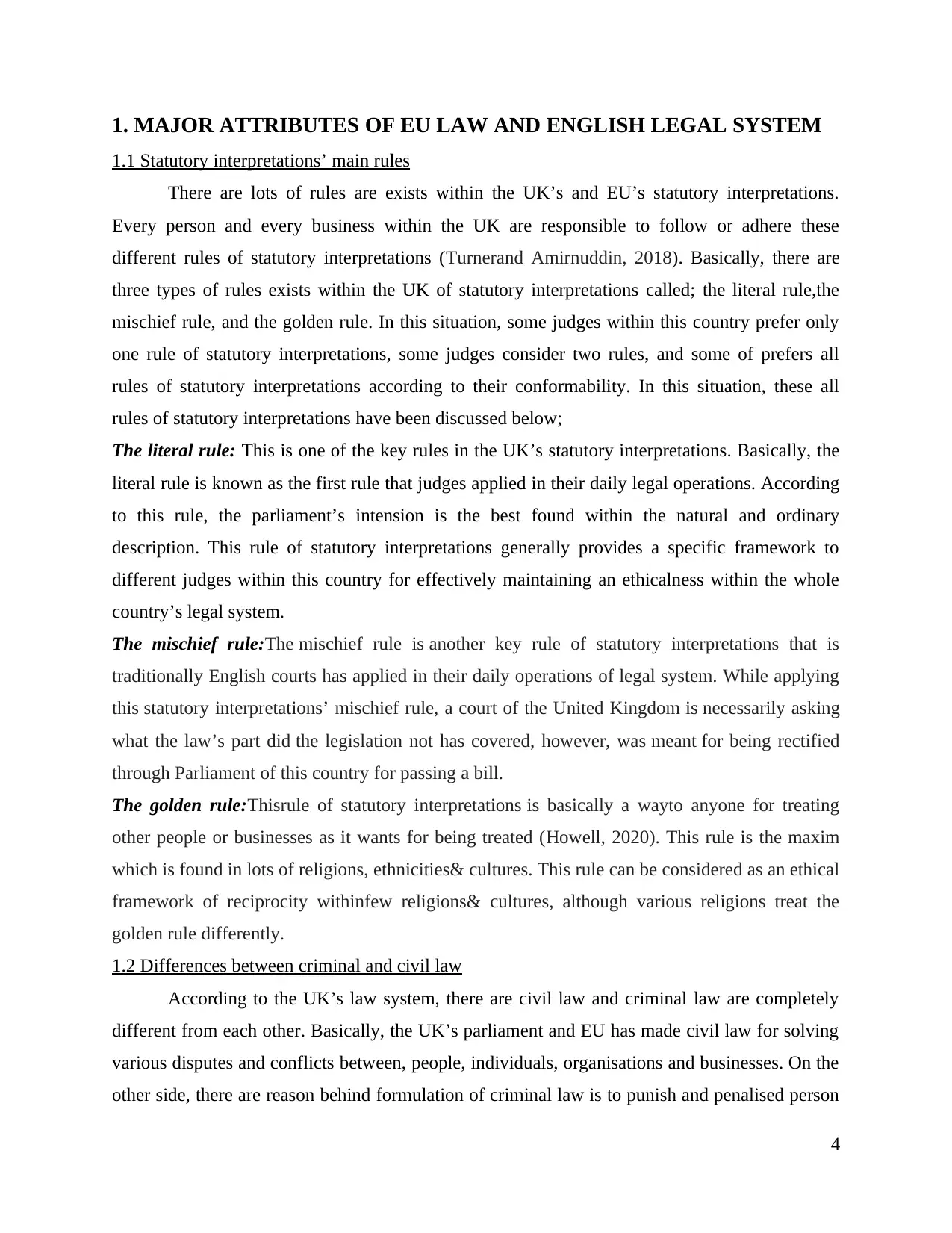
1. MAJOR ATTRIBUTES OF EU LAW AND ENGLISH LEGAL SYSTEM
1.1 Statutory interpretations’ main rules
There are lots of rules are exists within the UK’s and EU’s statutory interpretations.
Every person and every business within the UK are responsible to follow or adhere these
different rules of statutory interpretations (Turnerand Amirnuddin, 2018). Basically, there are
three types of rules exists within the UK of statutory interpretations called; the literal rule,the
mischief rule, and the golden rule. In this situation, some judges within this country prefer only
one rule of statutory interpretations, some judges consider two rules, and some of prefers all
rules of statutory interpretations according to their conformability. In this situation, these all
rules of statutory interpretations have been discussed below;
The literal rule: This is one of the key rules in the UK’s statutory interpretations. Basically, the
literal rule is known as the first rule that judges applied in their daily legal operations. According
to this rule, the parliament’s intension is the best found within the natural and ordinary
description. This rule of statutory interpretations generally provides a specific framework to
different judges within this country for effectively maintaining an ethicalness within the whole
country’s legal system.
The mischief rule:The mischief rule is another key rule of statutory interpretations that is
traditionally English courts has applied in their daily operations of legal system. While applying
this statutory interpretations’ mischief rule, a court of the United Kingdom is necessarily asking
what the law’s part did the legislation not has covered, however, was meant for being rectified
through Parliament of this country for passing a bill.
The golden rule:Thisrule of statutory interpretations is basically a wayto anyone for treating
other people or businesses as it wants for being treated (Howell, 2020). This rule is the maxim
which is found in lots of religions, ethnicities& cultures. This rule can be considered as an ethical
framework of reciprocity withinfew religions& cultures, although various religions treat the
golden rule differently.
1.2 Differences between criminal and civil law
According to the UK’s law system, there are civil law and criminal law are completely
different from each other. Basically, the UK’s parliament and EU has made civil law for solving
various disputes and conflicts between, people, individuals, organisations and businesses. On the
other side, there are reason behind formulation of criminal law is to punish and penalised person
4
1.1 Statutory interpretations’ main rules
There are lots of rules are exists within the UK’s and EU’s statutory interpretations.
Every person and every business within the UK are responsible to follow or adhere these
different rules of statutory interpretations (Turnerand Amirnuddin, 2018). Basically, there are
three types of rules exists within the UK of statutory interpretations called; the literal rule,the
mischief rule, and the golden rule. In this situation, some judges within this country prefer only
one rule of statutory interpretations, some judges consider two rules, and some of prefers all
rules of statutory interpretations according to their conformability. In this situation, these all
rules of statutory interpretations have been discussed below;
The literal rule: This is one of the key rules in the UK’s statutory interpretations. Basically, the
literal rule is known as the first rule that judges applied in their daily legal operations. According
to this rule, the parliament’s intension is the best found within the natural and ordinary
description. This rule of statutory interpretations generally provides a specific framework to
different judges within this country for effectively maintaining an ethicalness within the whole
country’s legal system.
The mischief rule:The mischief rule is another key rule of statutory interpretations that is
traditionally English courts has applied in their daily operations of legal system. While applying
this statutory interpretations’ mischief rule, a court of the United Kingdom is necessarily asking
what the law’s part did the legislation not has covered, however, was meant for being rectified
through Parliament of this country for passing a bill.
The golden rule:Thisrule of statutory interpretations is basically a wayto anyone for treating
other people or businesses as it wants for being treated (Howell, 2020). This rule is the maxim
which is found in lots of religions, ethnicities& cultures. This rule can be considered as an ethical
framework of reciprocity withinfew religions& cultures, although various religions treat the
golden rule differently.
1.2 Differences between criminal and civil law
According to the UK’s law system, there are civil law and criminal law are completely
different from each other. Basically, the UK’s parliament and EU has made civil law for solving
various disputes and conflicts between, people, individuals, organisations and businesses. On the
other side, there are reason behind formulation of criminal law is to punish and penalised person
4
Secure Best Marks with AI Grader
Need help grading? Try our AI Grader for instant feedback on your assignments.
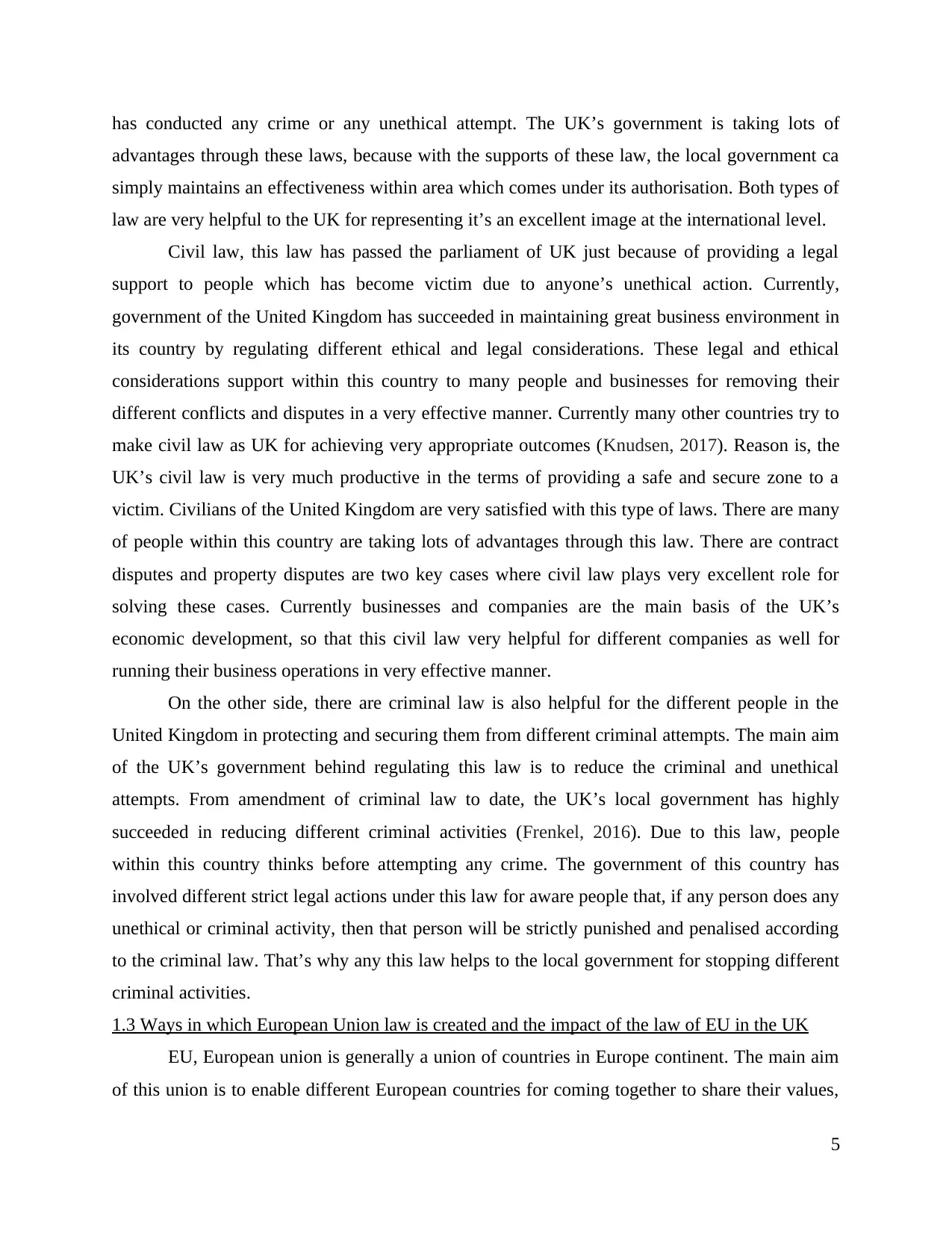
has conducted any crime or any unethical attempt. The UK’s government is taking lots of
advantages through these laws, because with the supports of these law, the local government ca
simply maintains an effectiveness within area which comes under its authorisation. Both types of
law are very helpful to the UK for representing it’s an excellent image at the international level.
Civil law, this law has passed the parliament of UK just because of providing a legal
support to people which has become victim due to anyone’s unethical action. Currently,
government of the United Kingdom has succeeded in maintaining great business environment in
its country by regulating different ethical and legal considerations. These legal and ethical
considerations support within this country to many people and businesses for removing their
different conflicts and disputes in a very effective manner. Currently many other countries try to
make civil law as UK for achieving very appropriate outcomes (Knudsen, 2017). Reason is, the
UK’s civil law is very much productive in the terms of providing a safe and secure zone to a
victim. Civilians of the United Kingdom are very satisfied with this type of laws. There are many
of people within this country are taking lots of advantages through this law. There are contract
disputes and property disputes are two key cases where civil law plays very excellent role for
solving these cases. Currently businesses and companies are the main basis of the UK’s
economic development, so that this civil law very helpful for different companies as well for
running their business operations in very effective manner.
On the other side, there are criminal law is also helpful for the different people in the
United Kingdom in protecting and securing them from different criminal attempts. The main aim
of the UK’s government behind regulating this law is to reduce the criminal and unethical
attempts. From amendment of criminal law to date, the UK’s local government has highly
succeeded in reducing different criminal activities (Frenkel, 2016). Due to this law, people
within this country thinks before attempting any crime. The government of this country has
involved different strict legal actions under this law for aware people that, if any person does any
unethical or criminal activity, then that person will be strictly punished and penalised according
to the criminal law. That’s why any this law helps to the local government for stopping different
criminal activities.
1.3 Ways in which European Union law is created and the impact of the law of EU in the UK
EU, European union is generally a union of countries in Europe continent. The main aim
of this union is to enable different European countries for coming together to share their values,
5
advantages through these laws, because with the supports of these law, the local government ca
simply maintains an effectiveness within area which comes under its authorisation. Both types of
law are very helpful to the UK for representing it’s an excellent image at the international level.
Civil law, this law has passed the parliament of UK just because of providing a legal
support to people which has become victim due to anyone’s unethical action. Currently,
government of the United Kingdom has succeeded in maintaining great business environment in
its country by regulating different ethical and legal considerations. These legal and ethical
considerations support within this country to many people and businesses for removing their
different conflicts and disputes in a very effective manner. Currently many other countries try to
make civil law as UK for achieving very appropriate outcomes (Knudsen, 2017). Reason is, the
UK’s civil law is very much productive in the terms of providing a safe and secure zone to a
victim. Civilians of the United Kingdom are very satisfied with this type of laws. There are many
of people within this country are taking lots of advantages through this law. There are contract
disputes and property disputes are two key cases where civil law plays very excellent role for
solving these cases. Currently businesses and companies are the main basis of the UK’s
economic development, so that this civil law very helpful for different companies as well for
running their business operations in very effective manner.
On the other side, there are criminal law is also helpful for the different people in the
United Kingdom in protecting and securing them from different criminal attempts. The main aim
of the UK’s government behind regulating this law is to reduce the criminal and unethical
attempts. From amendment of criminal law to date, the UK’s local government has highly
succeeded in reducing different criminal activities (Frenkel, 2016). Due to this law, people
within this country thinks before attempting any crime. The government of this country has
involved different strict legal actions under this law for aware people that, if any person does any
unethical or criminal activity, then that person will be strictly punished and penalised according
to the criminal law. That’s why any this law helps to the local government for stopping different
criminal activities.
1.3 Ways in which European Union law is created and the impact of the law of EU in the UK
EU, European union is generally a union of countries in Europe continent. The main aim
of this union is to enable different European countries for coming together to share their values,
5
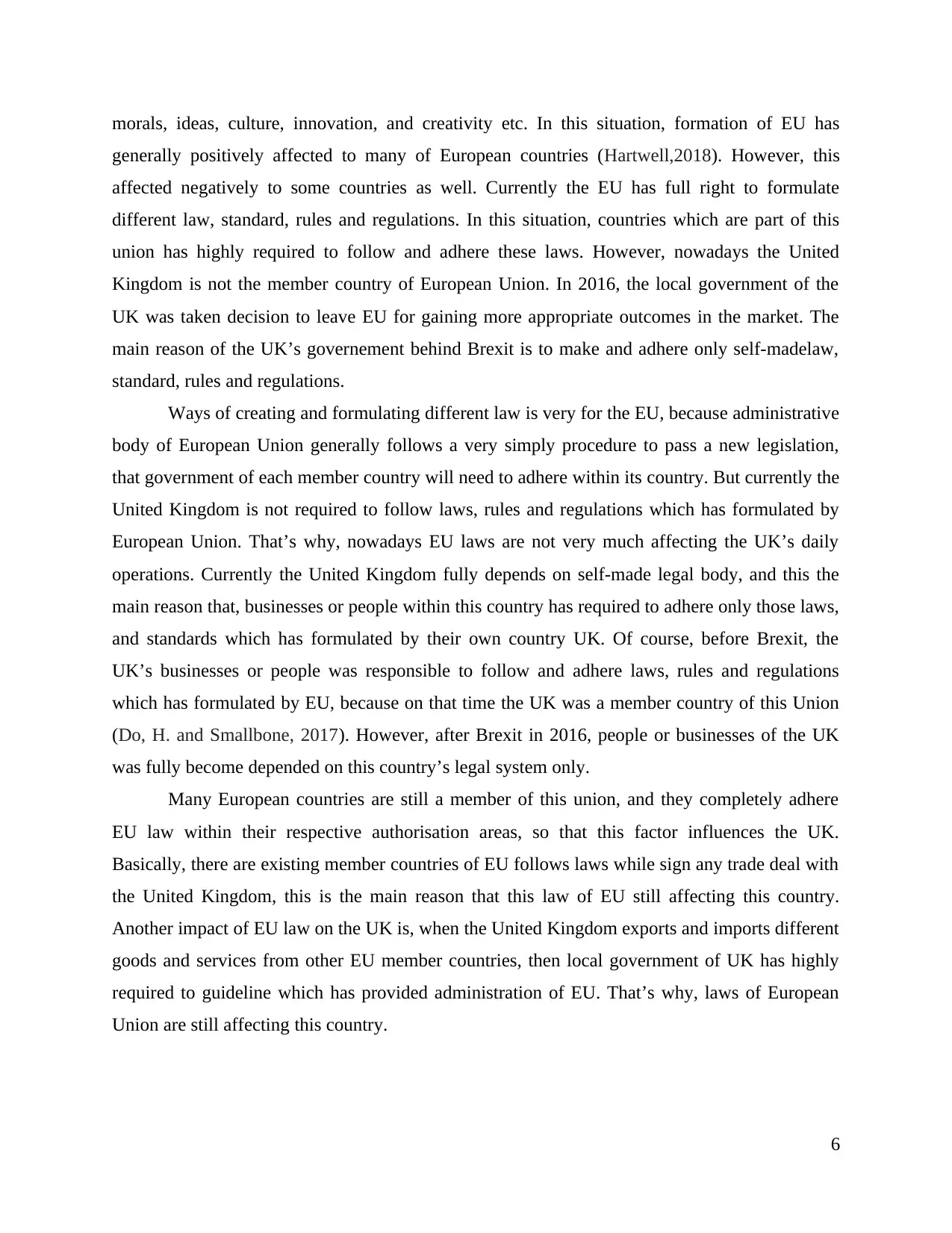
morals, ideas, culture, innovation, and creativity etc. In this situation, formation of EU has
generally positively affected to many of European countries (Hartwell,2018). However, this
affected negatively to some countries as well. Currently the EU has full right to formulate
different law, standard, rules and regulations. In this situation, countries which are part of this
union has highly required to follow and adhere these laws. However, nowadays the United
Kingdom is not the member country of European Union. In 2016, the local government of the
UK was taken decision to leave EU for gaining more appropriate outcomes in the market. The
main reason of the UK’s governement behind Brexit is to make and adhere only self-madelaw,
standard, rules and regulations.
Ways of creating and formulating different law is very for the EU, because administrative
body of European Union generally follows a very simply procedure to pass a new legislation,
that government of each member country will need to adhere within its country. But currently the
United Kingdom is not required to follow laws, rules and regulations which has formulated by
European Union. That’s why, nowadays EU laws are not very much affecting the UK’s daily
operations. Currently the United Kingdom fully depends on self-made legal body, and this the
main reason that, businesses or people within this country has required to adhere only those laws,
and standards which has formulated by their own country UK. Of course, before Brexit, the
UK’s businesses or people was responsible to follow and adhere laws, rules and regulations
which has formulated by EU, because on that time the UK was a member country of this Union
(Do, H. and Smallbone, 2017). However, after Brexit in 2016, people or businesses of the UK
was fully become depended on this country’s legal system only.
Many European countries are still a member of this union, and they completely adhere
EU law within their respective authorisation areas, so that this factor influences the UK.
Basically, there are existing member countries of EU follows laws while sign any trade deal with
the United Kingdom, this is the main reason that this law of EU still affecting this country.
Another impact of EU law on the UK is, when the United Kingdom exports and imports different
goods and services from other EU member countries, then local government of UK has highly
required to guideline which has provided administration of EU. That’s why, laws of European
Union are still affecting this country.
6
generally positively affected to many of European countries (Hartwell,2018). However, this
affected negatively to some countries as well. Currently the EU has full right to formulate
different law, standard, rules and regulations. In this situation, countries which are part of this
union has highly required to follow and adhere these laws. However, nowadays the United
Kingdom is not the member country of European Union. In 2016, the local government of the
UK was taken decision to leave EU for gaining more appropriate outcomes in the market. The
main reason of the UK’s governement behind Brexit is to make and adhere only self-madelaw,
standard, rules and regulations.
Ways of creating and formulating different law is very for the EU, because administrative
body of European Union generally follows a very simply procedure to pass a new legislation,
that government of each member country will need to adhere within its country. But currently the
United Kingdom is not required to follow laws, rules and regulations which has formulated by
European Union. That’s why, nowadays EU laws are not very much affecting the UK’s daily
operations. Currently the United Kingdom fully depends on self-made legal body, and this the
main reason that, businesses or people within this country has required to adhere only those laws,
and standards which has formulated by their own country UK. Of course, before Brexit, the
UK’s businesses or people was responsible to follow and adhere laws, rules and regulations
which has formulated by EU, because on that time the UK was a member country of this Union
(Do, H. and Smallbone, 2017). However, after Brexit in 2016, people or businesses of the UK
was fully become depended on this country’s legal system only.
Many European countries are still a member of this union, and they completely adhere
EU law within their respective authorisation areas, so that this factor influences the UK.
Basically, there are existing member countries of EU follows laws while sign any trade deal with
the United Kingdom, this is the main reason that this law of EU still affecting this country.
Another impact of EU law on the UK is, when the United Kingdom exports and imports different
goods and services from other EU member countries, then local government of UK has highly
required to guideline which has provided administration of EU. That’s why, laws of European
Union are still affecting this country.
6
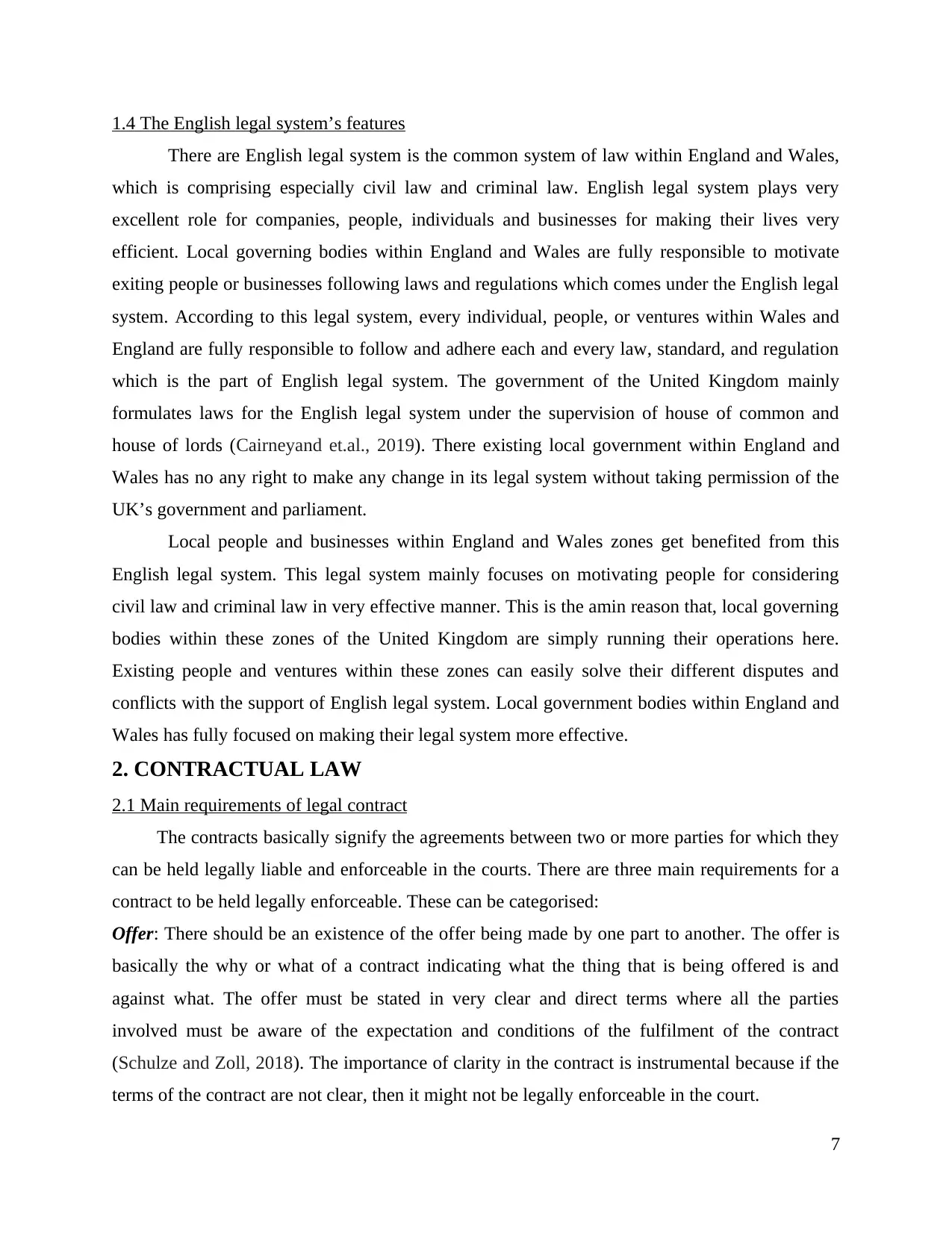
1.4 The English legal system’s features
There are English legal system is the common system of law within England and Wales,
which is comprising especially civil law and criminal law. English legal system plays very
excellent role for companies, people, individuals and businesses for making their lives very
efficient. Local governing bodies within England and Wales are fully responsible to motivate
exiting people or businesses following laws and regulations which comes under the English legal
system. According to this legal system, every individual, people, or ventures within Wales and
England are fully responsible to follow and adhere each and every law, standard, and regulation
which is the part of English legal system. The government of the United Kingdom mainly
formulates laws for the English legal system under the supervision of house of common and
house of lords (Cairneyand et.al., 2019). There existing local government within England and
Wales has no any right to make any change in its legal system without taking permission of the
UK’s government and parliament.
Local people and businesses within England and Wales zones get benefited from this
English legal system. This legal system mainly focuses on motivating people for considering
civil law and criminal law in very effective manner. This is the amin reason that, local governing
bodies within these zones of the United Kingdom are simply running their operations here.
Existing people and ventures within these zones can easily solve their different disputes and
conflicts with the support of English legal system. Local government bodies within England and
Wales has fully focused on making their legal system more effective.
2. CONTRACTUAL LAW
2.1 Main requirements of legal contract
The contracts basically signify the agreements between two or more parties for which they
can be held legally liable and enforceable in the courts. There are three main requirements for a
contract to be held legally enforceable. These can be categorised:
Offer: There should be an existence of the offer being made by one part to another. The offer is
basically the why or what of a contract indicating what the thing that is being offered is and
against what. The offer must be stated in very clear and direct terms where all the parties
involved must be aware of the expectation and conditions of the fulfilment of the contract
(Schulze and Zoll, 2018). The importance of clarity in the contract is instrumental because if the
terms of the contract are not clear, then it might not be legally enforceable in the court.
7
There are English legal system is the common system of law within England and Wales,
which is comprising especially civil law and criminal law. English legal system plays very
excellent role for companies, people, individuals and businesses for making their lives very
efficient. Local governing bodies within England and Wales are fully responsible to motivate
exiting people or businesses following laws and regulations which comes under the English legal
system. According to this legal system, every individual, people, or ventures within Wales and
England are fully responsible to follow and adhere each and every law, standard, and regulation
which is the part of English legal system. The government of the United Kingdom mainly
formulates laws for the English legal system under the supervision of house of common and
house of lords (Cairneyand et.al., 2019). There existing local government within England and
Wales has no any right to make any change in its legal system without taking permission of the
UK’s government and parliament.
Local people and businesses within England and Wales zones get benefited from this
English legal system. This legal system mainly focuses on motivating people for considering
civil law and criminal law in very effective manner. This is the amin reason that, local governing
bodies within these zones of the United Kingdom are simply running their operations here.
Existing people and ventures within these zones can easily solve their different disputes and
conflicts with the support of English legal system. Local government bodies within England and
Wales has fully focused on making their legal system more effective.
2. CONTRACTUAL LAW
2.1 Main requirements of legal contract
The contracts basically signify the agreements between two or more parties for which they
can be held legally liable and enforceable in the courts. There are three main requirements for a
contract to be held legally enforceable. These can be categorised:
Offer: There should be an existence of the offer being made by one part to another. The offer is
basically the why or what of a contract indicating what the thing that is being offered is and
against what. The offer must be stated in very clear and direct terms where all the parties
involved must be aware of the expectation and conditions of the fulfilment of the contract
(Schulze and Zoll, 2018). The importance of clarity in the contract is instrumental because if the
terms of the contract are not clear, then it might not be legally enforceable in the court.
7
Paraphrase This Document
Need a fresh take? Get an instant paraphrase of this document with our AI Paraphraser
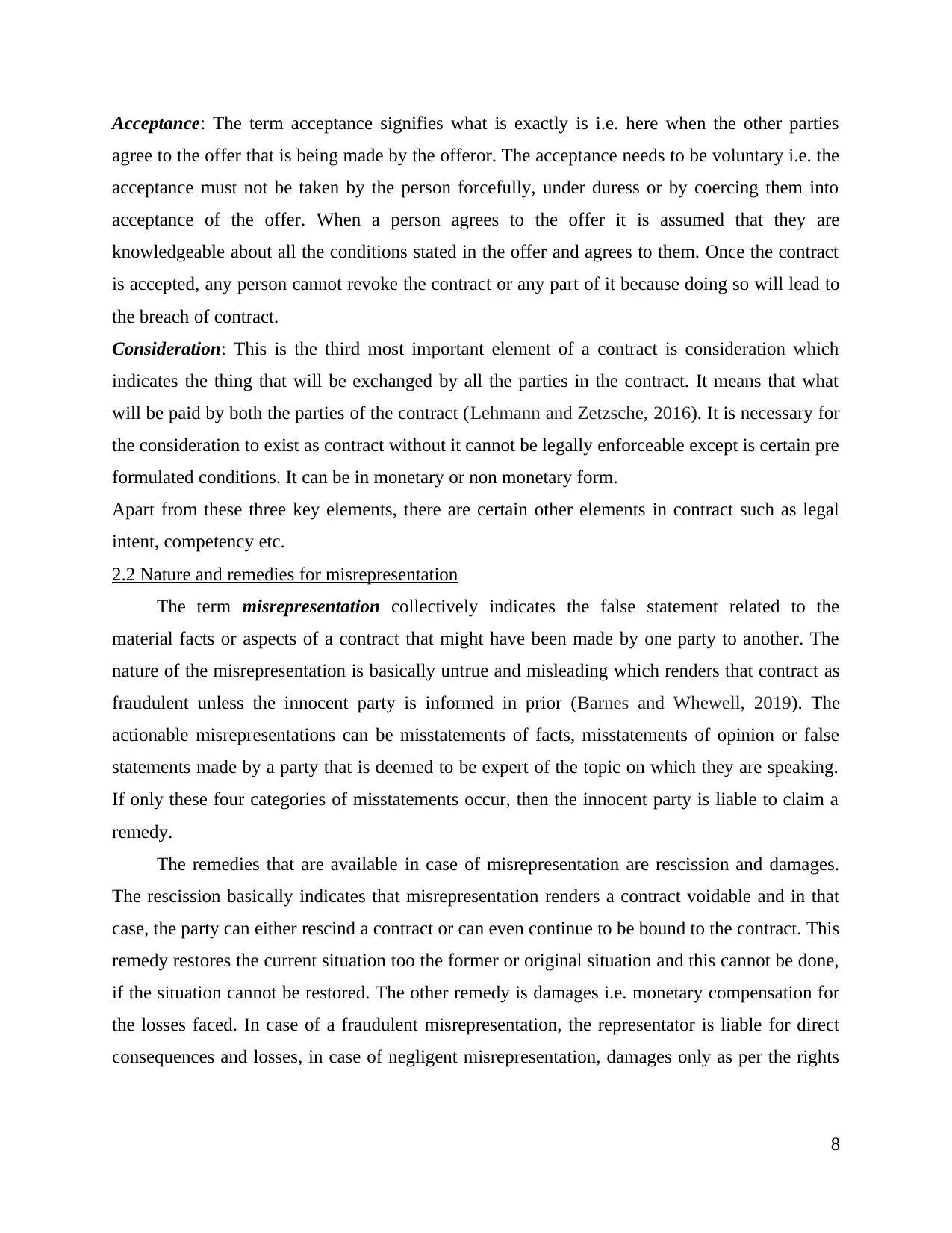
Acceptance: The term acceptance signifies what is exactly is i.e. here when the other parties
agree to the offer that is being made by the offeror. The acceptance needs to be voluntary i.e. the
acceptance must not be taken by the person forcefully, under duress or by coercing them into
acceptance of the offer. When a person agrees to the offer it is assumed that they are
knowledgeable about all the conditions stated in the offer and agrees to them. Once the contract
is accepted, any person cannot revoke the contract or any part of it because doing so will lead to
the breach of contract.
Consideration: This is the third most important element of a contract is consideration which
indicates the thing that will be exchanged by all the parties in the contract. It means that what
will be paid by both the parties of the contract (Lehmann and Zetzsche, 2016). It is necessary for
the consideration to exist as contract without it cannot be legally enforceable except is certain pre
formulated conditions. It can be in monetary or non monetary form.
Apart from these three key elements, there are certain other elements in contract such as legal
intent, competency etc.
2.2 Nature and remedies for misrepresentation
The term misrepresentation collectively indicates the false statement related to the
material facts or aspects of a contract that might have been made by one party to another. The
nature of the misrepresentation is basically untrue and misleading which renders that contract as
fraudulent unless the innocent party is informed in prior (Barnes and Whewell, 2019). The
actionable misrepresentations can be misstatements of facts, misstatements of opinion or false
statements made by a party that is deemed to be expert of the topic on which they are speaking.
If only these four categories of misstatements occur, then the innocent party is liable to claim a
remedy.
The remedies that are available in case of misrepresentation are rescission and damages.
The rescission basically indicates that misrepresentation renders a contract voidable and in that
case, the party can either rescind a contract or can even continue to be bound to the contract. This
remedy restores the current situation too the former or original situation and this cannot be done,
if the situation cannot be restored. The other remedy is damages i.e. monetary compensation for
the losses faced. In case of a fraudulent misrepresentation, the representator is liable for direct
consequences and losses, in case of negligent misrepresentation, damages only as per the rights
8
agree to the offer that is being made by the offeror. The acceptance needs to be voluntary i.e. the
acceptance must not be taken by the person forcefully, under duress or by coercing them into
acceptance of the offer. When a person agrees to the offer it is assumed that they are
knowledgeable about all the conditions stated in the offer and agrees to them. Once the contract
is accepted, any person cannot revoke the contract or any part of it because doing so will lead to
the breach of contract.
Consideration: This is the third most important element of a contract is consideration which
indicates the thing that will be exchanged by all the parties in the contract. It means that what
will be paid by both the parties of the contract (Lehmann and Zetzsche, 2016). It is necessary for
the consideration to exist as contract without it cannot be legally enforceable except is certain pre
formulated conditions. It can be in monetary or non monetary form.
Apart from these three key elements, there are certain other elements in contract such as legal
intent, competency etc.
2.2 Nature and remedies for misrepresentation
The term misrepresentation collectively indicates the false statement related to the
material facts or aspects of a contract that might have been made by one party to another. The
nature of the misrepresentation is basically untrue and misleading which renders that contract as
fraudulent unless the innocent party is informed in prior (Barnes and Whewell, 2019). The
actionable misrepresentations can be misstatements of facts, misstatements of opinion or false
statements made by a party that is deemed to be expert of the topic on which they are speaking.
If only these four categories of misstatements occur, then the innocent party is liable to claim a
remedy.
The remedies that are available in case of misrepresentation are rescission and damages.
The rescission basically indicates that misrepresentation renders a contract voidable and in that
case, the party can either rescind a contract or can even continue to be bound to the contract. This
remedy restores the current situation too the former or original situation and this cannot be done,
if the situation cannot be restored. The other remedy is damages i.e. monetary compensation for
the losses faced. In case of a fraudulent misrepresentation, the representator is liable for direct
consequences and losses, in case of negligent misrepresentation, damages only as per the rights
8
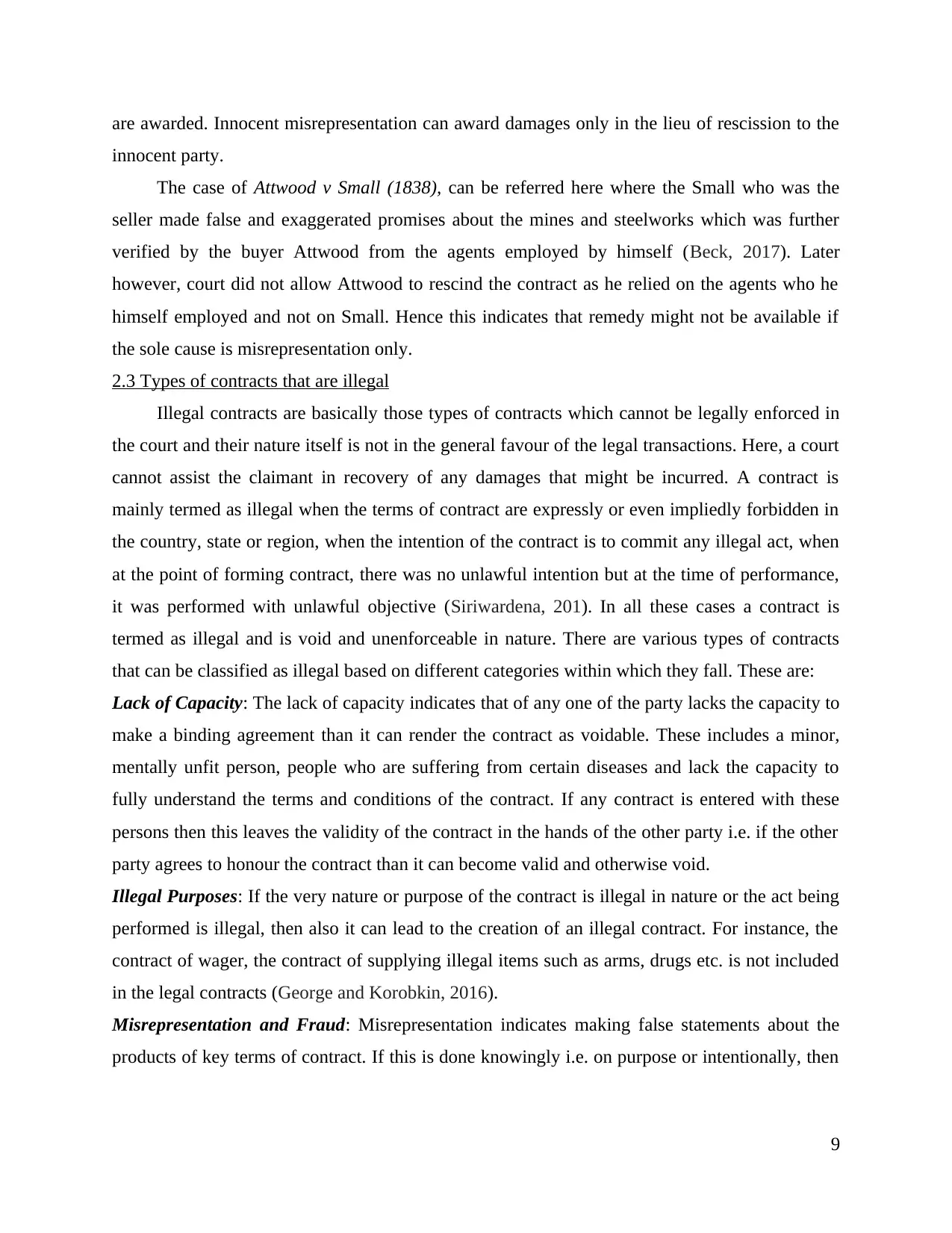
are awarded. Innocent misrepresentation can award damages only in the lieu of rescission to the
innocent party.
The case of Attwood v Small (1838), can be referred here where the Small who was the
seller made false and exaggerated promises about the mines and steelworks which was further
verified by the buyer Attwood from the agents employed by himself (Beck, 2017). Later
however, court did not allow Attwood to rescind the contract as he relied on the agents who he
himself employed and not on Small. Hence this indicates that remedy might not be available if
the sole cause is misrepresentation only.
2.3 Types of contracts that are illegal
Illegal contracts are basically those types of contracts which cannot be legally enforced in
the court and their nature itself is not in the general favour of the legal transactions. Here, a court
cannot assist the claimant in recovery of any damages that might be incurred. A contract is
mainly termed as illegal when the terms of contract are expressly or even impliedly forbidden in
the country, state or region, when the intention of the contract is to commit any illegal act, when
at the point of forming contract, there was no unlawful intention but at the time of performance,
it was performed with unlawful objective (Siriwardena, 201). In all these cases a contract is
termed as illegal and is void and unenforceable in nature. There are various types of contracts
that can be classified as illegal based on different categories within which they fall. These are:
Lack of Capacity: The lack of capacity indicates that of any one of the party lacks the capacity to
make a binding agreement than it can render the contract as voidable. These includes a minor,
mentally unfit person, people who are suffering from certain diseases and lack the capacity to
fully understand the terms and conditions of the contract. If any contract is entered with these
persons then this leaves the validity of the contract in the hands of the other party i.e. if the other
party agrees to honour the contract than it can become valid and otherwise void.
Illegal Purposes: If the very nature or purpose of the contract is illegal in nature or the act being
performed is illegal, then also it can lead to the creation of an illegal contract. For instance, the
contract of wager, the contract of supplying illegal items such as arms, drugs etc. is not included
in the legal contracts (George and Korobkin, 2016).
Misrepresentation and Fraud: Misrepresentation indicates making false statements about the
products of key terms of contract. If this is done knowingly i.e. on purpose or intentionally, then
9
innocent party.
The case of Attwood v Small (1838), can be referred here where the Small who was the
seller made false and exaggerated promises about the mines and steelworks which was further
verified by the buyer Attwood from the agents employed by himself (Beck, 2017). Later
however, court did not allow Attwood to rescind the contract as he relied on the agents who he
himself employed and not on Small. Hence this indicates that remedy might not be available if
the sole cause is misrepresentation only.
2.3 Types of contracts that are illegal
Illegal contracts are basically those types of contracts which cannot be legally enforced in
the court and their nature itself is not in the general favour of the legal transactions. Here, a court
cannot assist the claimant in recovery of any damages that might be incurred. A contract is
mainly termed as illegal when the terms of contract are expressly or even impliedly forbidden in
the country, state or region, when the intention of the contract is to commit any illegal act, when
at the point of forming contract, there was no unlawful intention but at the time of performance,
it was performed with unlawful objective (Siriwardena, 201). In all these cases a contract is
termed as illegal and is void and unenforceable in nature. There are various types of contracts
that can be classified as illegal based on different categories within which they fall. These are:
Lack of Capacity: The lack of capacity indicates that of any one of the party lacks the capacity to
make a binding agreement than it can render the contract as voidable. These includes a minor,
mentally unfit person, people who are suffering from certain diseases and lack the capacity to
fully understand the terms and conditions of the contract. If any contract is entered with these
persons then this leaves the validity of the contract in the hands of the other party i.e. if the other
party agrees to honour the contract than it can become valid and otherwise void.
Illegal Purposes: If the very nature or purpose of the contract is illegal in nature or the act being
performed is illegal, then also it can lead to the creation of an illegal contract. For instance, the
contract of wager, the contract of supplying illegal items such as arms, drugs etc. is not included
in the legal contracts (George and Korobkin, 2016).
Misrepresentation and Fraud: Misrepresentation indicates making false statements about the
products of key terms of contract. If this is done knowingly i.e. on purpose or intentionally, then
9
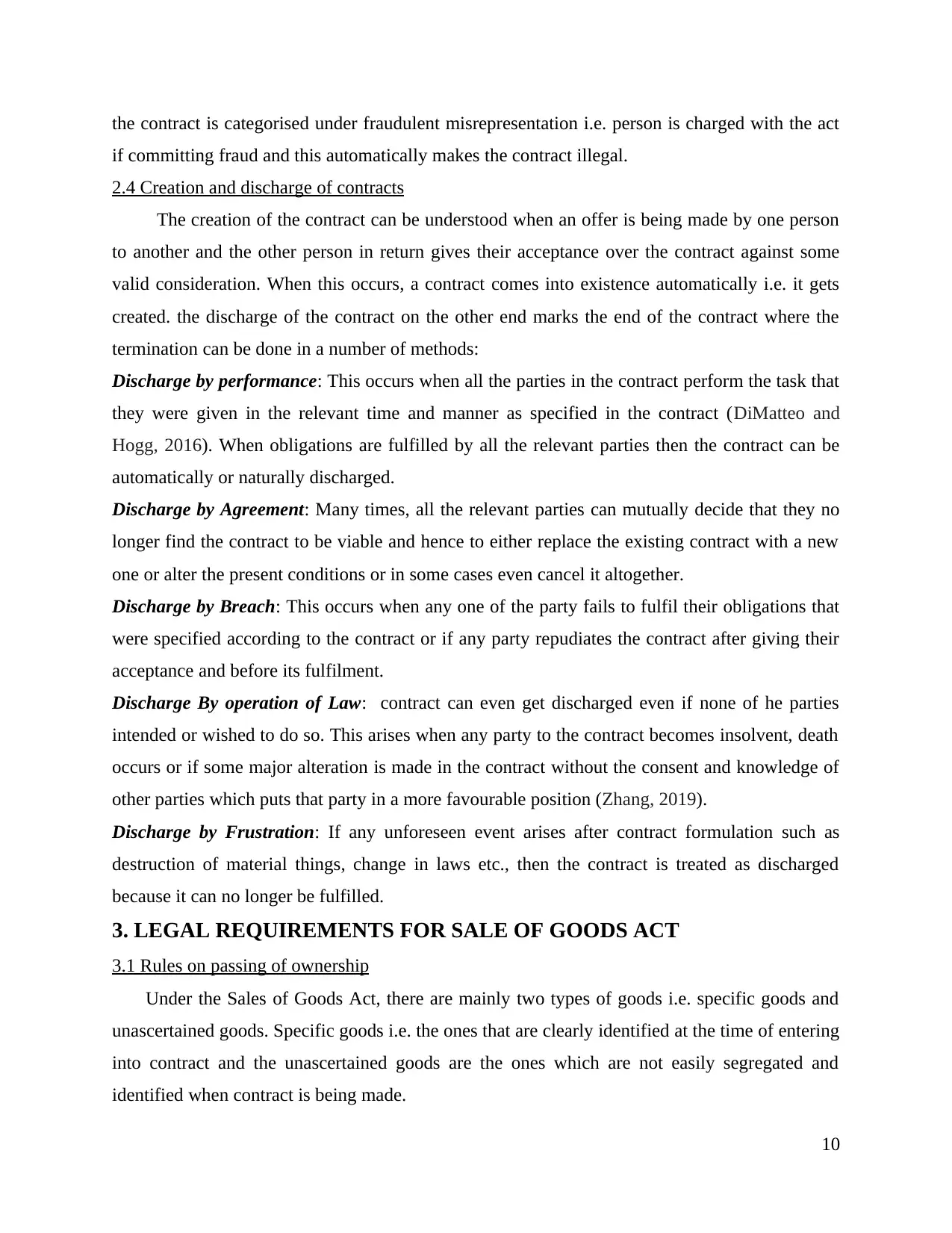
the contract is categorised under fraudulent misrepresentation i.e. person is charged with the act
if committing fraud and this automatically makes the contract illegal.
2.4 Creation and discharge of contracts
The creation of the contract can be understood when an offer is being made by one person
to another and the other person in return gives their acceptance over the contract against some
valid consideration. When this occurs, a contract comes into existence automatically i.e. it gets
created. the discharge of the contract on the other end marks the end of the contract where the
termination can be done in a number of methods:
Discharge by performance: This occurs when all the parties in the contract perform the task that
they were given in the relevant time and manner as specified in the contract (DiMatteo and
Hogg, 2016). When obligations are fulfilled by all the relevant parties then the contract can be
automatically or naturally discharged.
Discharge by Agreement: Many times, all the relevant parties can mutually decide that they no
longer find the contract to be viable and hence to either replace the existing contract with a new
one or alter the present conditions or in some cases even cancel it altogether.
Discharge by Breach: This occurs when any one of the party fails to fulfil their obligations that
were specified according to the contract or if any party repudiates the contract after giving their
acceptance and before its fulfilment.
Discharge By operation of Law: contract can even get discharged even if none of he parties
intended or wished to do so. This arises when any party to the contract becomes insolvent, death
occurs or if some major alteration is made in the contract without the consent and knowledge of
other parties which puts that party in a more favourable position (Zhang, 2019).
Discharge by Frustration: If any unforeseen event arises after contract formulation such as
destruction of material things, change in laws etc., then the contract is treated as discharged
because it can no longer be fulfilled.
3. LEGAL REQUIREMENTS FOR SALE OF GOODS ACT
3.1 Rules on passing of ownership
Under the Sales of Goods Act, there are mainly two types of goods i.e. specific goods and
unascertained goods. Specific goods i.e. the ones that are clearly identified at the time of entering
into contract and the unascertained goods are the ones which are not easily segregated and
identified when contract is being made.
10
if committing fraud and this automatically makes the contract illegal.
2.4 Creation and discharge of contracts
The creation of the contract can be understood when an offer is being made by one person
to another and the other person in return gives their acceptance over the contract against some
valid consideration. When this occurs, a contract comes into existence automatically i.e. it gets
created. the discharge of the contract on the other end marks the end of the contract where the
termination can be done in a number of methods:
Discharge by performance: This occurs when all the parties in the contract perform the task that
they were given in the relevant time and manner as specified in the contract (DiMatteo and
Hogg, 2016). When obligations are fulfilled by all the relevant parties then the contract can be
automatically or naturally discharged.
Discharge by Agreement: Many times, all the relevant parties can mutually decide that they no
longer find the contract to be viable and hence to either replace the existing contract with a new
one or alter the present conditions or in some cases even cancel it altogether.
Discharge by Breach: This occurs when any one of the party fails to fulfil their obligations that
were specified according to the contract or if any party repudiates the contract after giving their
acceptance and before its fulfilment.
Discharge By operation of Law: contract can even get discharged even if none of he parties
intended or wished to do so. This arises when any party to the contract becomes insolvent, death
occurs or if some major alteration is made in the contract without the consent and knowledge of
other parties which puts that party in a more favourable position (Zhang, 2019).
Discharge by Frustration: If any unforeseen event arises after contract formulation such as
destruction of material things, change in laws etc., then the contract is treated as discharged
because it can no longer be fulfilled.
3. LEGAL REQUIREMENTS FOR SALE OF GOODS ACT
3.1 Rules on passing of ownership
Under the Sales of Goods Act, there are mainly two types of goods i.e. specific goods and
unascertained goods. Specific goods i.e. the ones that are clearly identified at the time of entering
into contract and the unascertained goods are the ones which are not easily segregated and
identified when contract is being made.
10
Secure Best Marks with AI Grader
Need help grading? Try our AI Grader for instant feedback on your assignments.
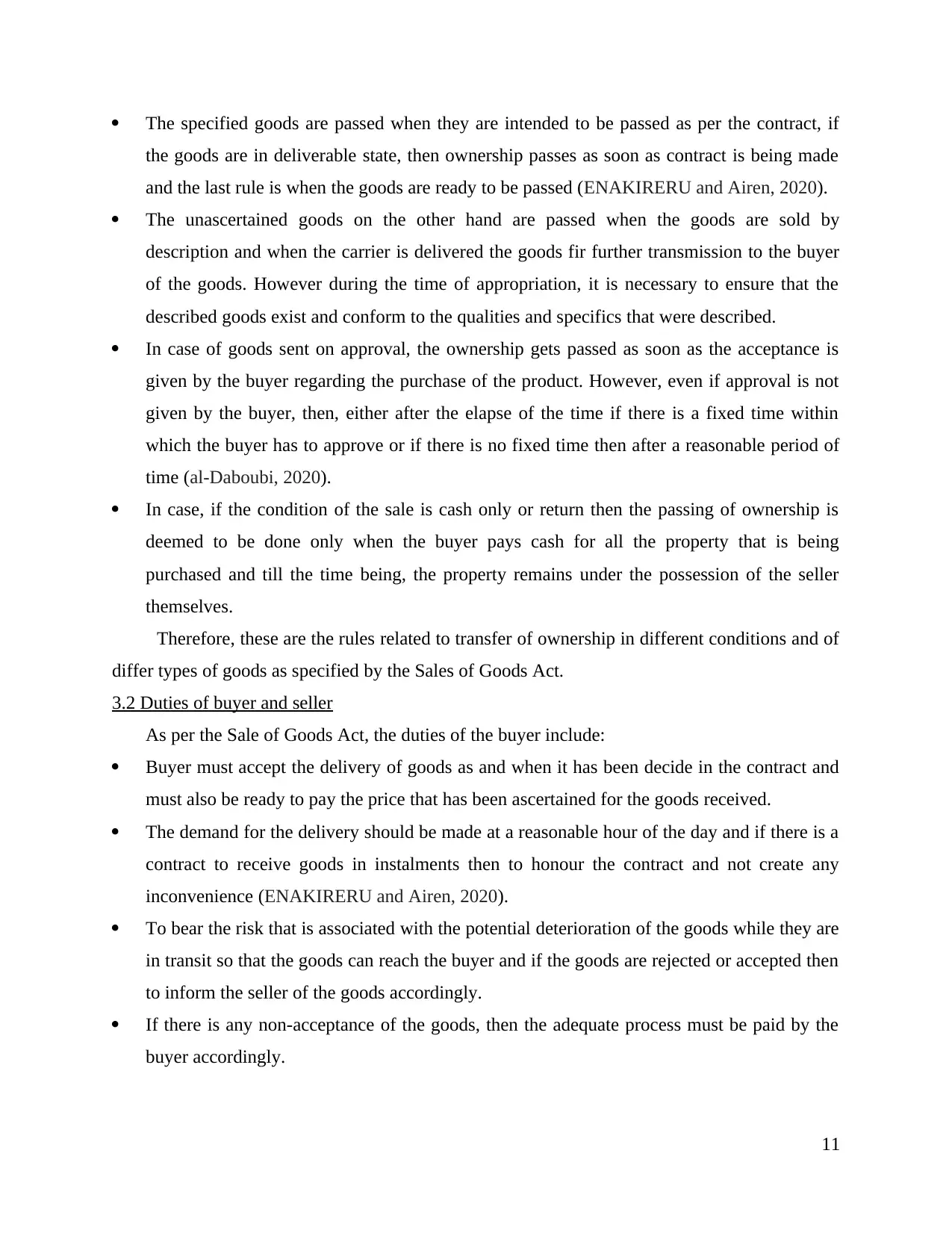
The specified goods are passed when they are intended to be passed as per the contract, if
the goods are in deliverable state, then ownership passes as soon as contract is being made
and the last rule is when the goods are ready to be passed (ENAKIRERU and Airen, 2020).
The unascertained goods on the other hand are passed when the goods are sold by
description and when the carrier is delivered the goods fir further transmission to the buyer
of the goods. However during the time of appropriation, it is necessary to ensure that the
described goods exist and conform to the qualities and specifics that were described.
In case of goods sent on approval, the ownership gets passed as soon as the acceptance is
given by the buyer regarding the purchase of the product. However, even if approval is not
given by the buyer, then, either after the elapse of the time if there is a fixed time within
which the buyer has to approve or if there is no fixed time then after a reasonable period of
time (al-Daboubi, 2020).
In case, if the condition of the sale is cash only or return then the passing of ownership is
deemed to be done only when the buyer pays cash for all the property that is being
purchased and till the time being, the property remains under the possession of the seller
themselves.
Therefore, these are the rules related to transfer of ownership in different conditions and of
differ types of goods as specified by the Sales of Goods Act.
3.2 Duties of buyer and seller
As per the Sale of Goods Act, the duties of the buyer include:
Buyer must accept the delivery of goods as and when it has been decide in the contract and
must also be ready to pay the price that has been ascertained for the goods received.
The demand for the delivery should be made at a reasonable hour of the day and if there is a
contract to receive goods in instalments then to honour the contract and not create any
inconvenience (ENAKIRERU and Airen, 2020).
To bear the risk that is associated with the potential deterioration of the goods while they are
in transit so that the goods can reach the buyer and if the goods are rejected or accepted then
to inform the seller of the goods accordingly.
If there is any non-acceptance of the goods, then the adequate process must be paid by the
buyer accordingly.
11
the goods are in deliverable state, then ownership passes as soon as contract is being made
and the last rule is when the goods are ready to be passed (ENAKIRERU and Airen, 2020).
The unascertained goods on the other hand are passed when the goods are sold by
description and when the carrier is delivered the goods fir further transmission to the buyer
of the goods. However during the time of appropriation, it is necessary to ensure that the
described goods exist and conform to the qualities and specifics that were described.
In case of goods sent on approval, the ownership gets passed as soon as the acceptance is
given by the buyer regarding the purchase of the product. However, even if approval is not
given by the buyer, then, either after the elapse of the time if there is a fixed time within
which the buyer has to approve or if there is no fixed time then after a reasonable period of
time (al-Daboubi, 2020).
In case, if the condition of the sale is cash only or return then the passing of ownership is
deemed to be done only when the buyer pays cash for all the property that is being
purchased and till the time being, the property remains under the possession of the seller
themselves.
Therefore, these are the rules related to transfer of ownership in different conditions and of
differ types of goods as specified by the Sales of Goods Act.
3.2 Duties of buyer and seller
As per the Sale of Goods Act, the duties of the buyer include:
Buyer must accept the delivery of goods as and when it has been decide in the contract and
must also be ready to pay the price that has been ascertained for the goods received.
The demand for the delivery should be made at a reasonable hour of the day and if there is a
contract to receive goods in instalments then to honour the contract and not create any
inconvenience (ENAKIRERU and Airen, 2020).
To bear the risk that is associated with the potential deterioration of the goods while they are
in transit so that the goods can reach the buyer and if the goods are rejected or accepted then
to inform the seller of the goods accordingly.
If there is any non-acceptance of the goods, then the adequate process must be paid by the
buyer accordingly.
11
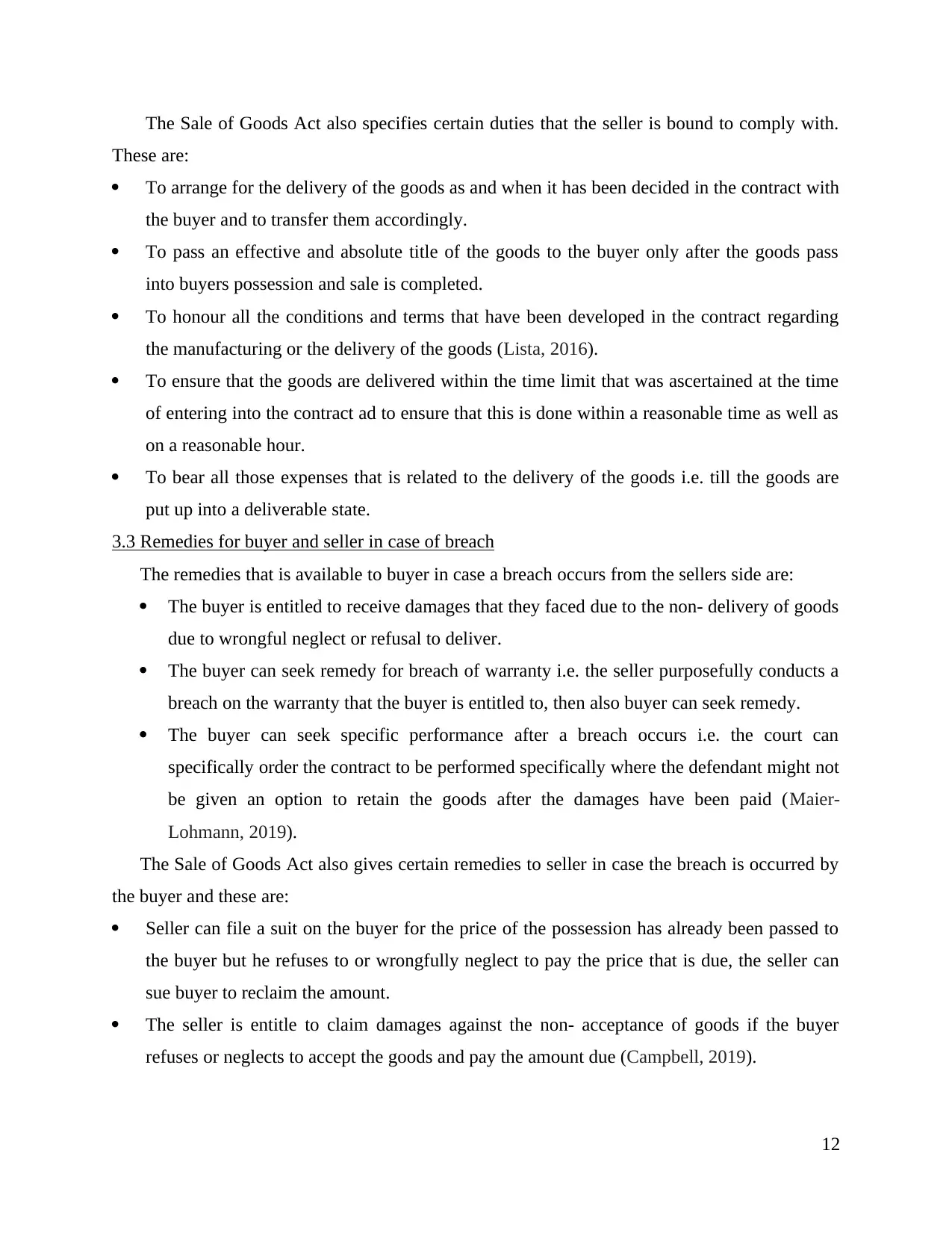
The Sale of Goods Act also specifies certain duties that the seller is bound to comply with.
These are:
To arrange for the delivery of the goods as and when it has been decided in the contract with
the buyer and to transfer them accordingly.
To pass an effective and absolute title of the goods to the buyer only after the goods pass
into buyers possession and sale is completed.
To honour all the conditions and terms that have been developed in the contract regarding
the manufacturing or the delivery of the goods (Lista, 2016).
To ensure that the goods are delivered within the time limit that was ascertained at the time
of entering into the contract ad to ensure that this is done within a reasonable time as well as
on a reasonable hour.
To bear all those expenses that is related to the delivery of the goods i.e. till the goods are
put up into a deliverable state.
3.3 Remedies for buyer and seller in case of breach
The remedies that is available to buyer in case a breach occurs from the sellers side are:
The buyer is entitled to receive damages that they faced due to the non- delivery of goods
due to wrongful neglect or refusal to deliver.
The buyer can seek remedy for breach of warranty i.e. the seller purposefully conducts a
breach on the warranty that the buyer is entitled to, then also buyer can seek remedy.
The buyer can seek specific performance after a breach occurs i.e. the court can
specifically order the contract to be performed specifically where the defendant might not
be given an option to retain the goods after the damages have been paid (Maier-
Lohmann, 2019).
The Sale of Goods Act also gives certain remedies to seller in case the breach is occurred by
the buyer and these are:
Seller can file a suit on the buyer for the price of the possession has already been passed to
the buyer but he refuses to or wrongfully neglect to pay the price that is due, the seller can
sue buyer to reclaim the amount.
The seller is entitle to claim damages against the non- acceptance of goods if the buyer
refuses or neglects to accept the goods and pay the amount due (Campbell, 2019).
12
These are:
To arrange for the delivery of the goods as and when it has been decided in the contract with
the buyer and to transfer them accordingly.
To pass an effective and absolute title of the goods to the buyer only after the goods pass
into buyers possession and sale is completed.
To honour all the conditions and terms that have been developed in the contract regarding
the manufacturing or the delivery of the goods (Lista, 2016).
To ensure that the goods are delivered within the time limit that was ascertained at the time
of entering into the contract ad to ensure that this is done within a reasonable time as well as
on a reasonable hour.
To bear all those expenses that is related to the delivery of the goods i.e. till the goods are
put up into a deliverable state.
3.3 Remedies for buyer and seller in case of breach
The remedies that is available to buyer in case a breach occurs from the sellers side are:
The buyer is entitled to receive damages that they faced due to the non- delivery of goods
due to wrongful neglect or refusal to deliver.
The buyer can seek remedy for breach of warranty i.e. the seller purposefully conducts a
breach on the warranty that the buyer is entitled to, then also buyer can seek remedy.
The buyer can seek specific performance after a breach occurs i.e. the court can
specifically order the contract to be performed specifically where the defendant might not
be given an option to retain the goods after the damages have been paid (Maier-
Lohmann, 2019).
The Sale of Goods Act also gives certain remedies to seller in case the breach is occurred by
the buyer and these are:
Seller can file a suit on the buyer for the price of the possession has already been passed to
the buyer but he refuses to or wrongfully neglect to pay the price that is due, the seller can
sue buyer to reclaim the amount.
The seller is entitle to claim damages against the non- acceptance of goods if the buyer
refuses or neglects to accept the goods and pay the amount due (Campbell, 2019).
12
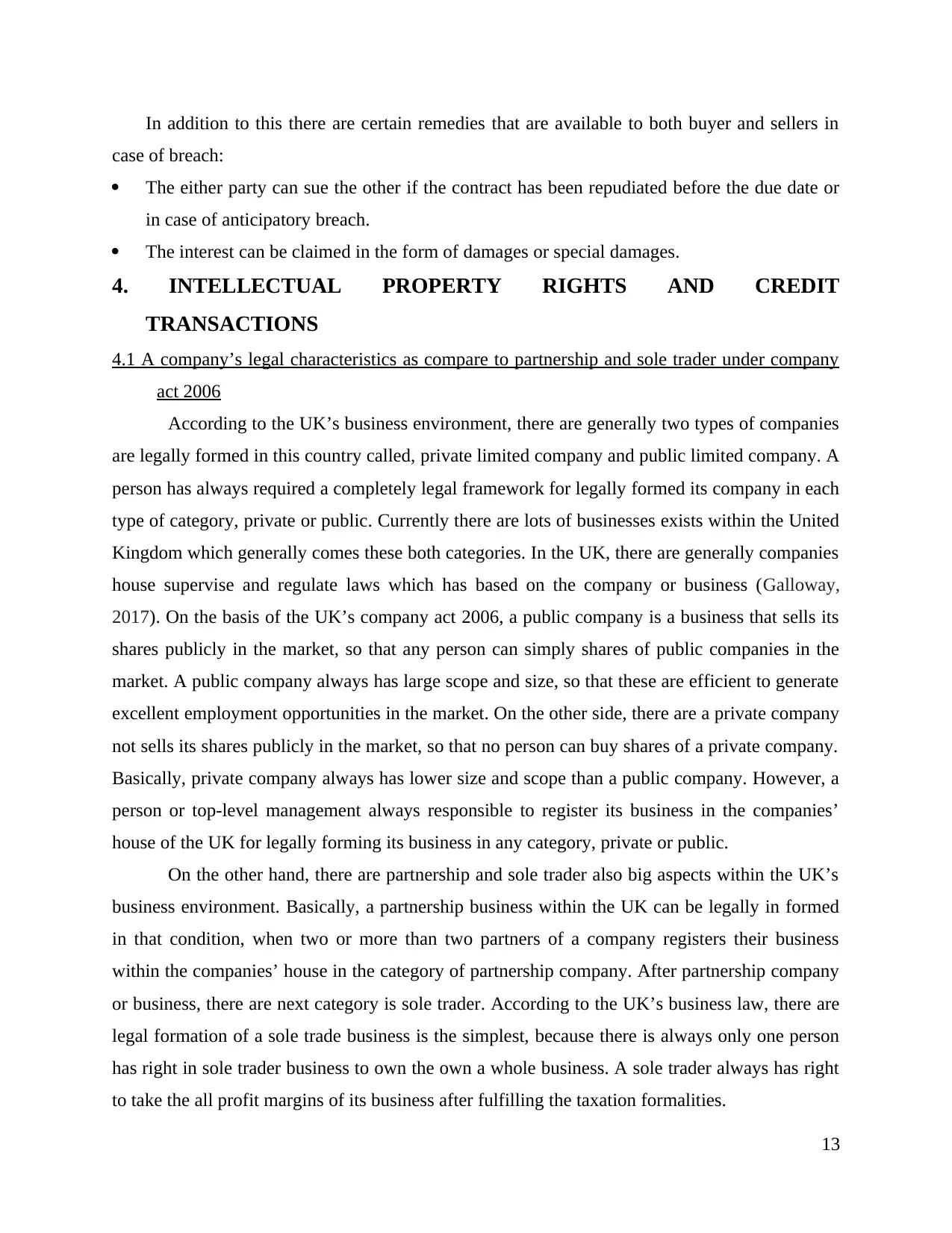
In addition to this there are certain remedies that are available to both buyer and sellers in
case of breach:
The either party can sue the other if the contract has been repudiated before the due date or
in case of anticipatory breach.
The interest can be claimed in the form of damages or special damages.
4. INTELLECTUAL PROPERTY RIGHTS AND CREDIT
TRANSACTIONS
4.1 A company’s legal characteristics as compare to partnership and sole trader under company
act 2006
According to the UK’s business environment, there are generally two types of companies
are legally formed in this country called, private limited company and public limited company. A
person has always required a completely legal framework for legally formed its company in each
type of category, private or public. Currently there are lots of businesses exists within the United
Kingdom which generally comes these both categories. In the UK, there are generally companies
house supervise and regulate laws which has based on the company or business (Galloway,
2017). On the basis of the UK’s company act 2006, a public company is a business that sells its
shares publicly in the market, so that any person can simply shares of public companies in the
market. A public company always has large scope and size, so that these are efficient to generate
excellent employment opportunities in the market. On the other side, there are a private company
not sells its shares publicly in the market, so that no person can buy shares of a private company.
Basically, private company always has lower size and scope than a public company. However, a
person or top-level management always responsible to register its business in the companies’
house of the UK for legally forming its business in any category, private or public.
On the other hand, there are partnership and sole trader also big aspects within the UK’s
business environment. Basically, a partnership business within the UK can be legally in formed
in that condition, when two or more than two partners of a company registers their business
within the companies’ house in the category of partnership company. After partnership company
or business, there are next category is sole trader. According to the UK’s business law, there are
legal formation of a sole trade business is the simplest, because there is always only one person
has right in sole trader business to own the own a whole business. A sole trader always has right
to take the all profit margins of its business after fulfilling the taxation formalities.
13
case of breach:
The either party can sue the other if the contract has been repudiated before the due date or
in case of anticipatory breach.
The interest can be claimed in the form of damages or special damages.
4. INTELLECTUAL PROPERTY RIGHTS AND CREDIT
TRANSACTIONS
4.1 A company’s legal characteristics as compare to partnership and sole trader under company
act 2006
According to the UK’s business environment, there are generally two types of companies
are legally formed in this country called, private limited company and public limited company. A
person has always required a completely legal framework for legally formed its company in each
type of category, private or public. Currently there are lots of businesses exists within the United
Kingdom which generally comes these both categories. In the UK, there are generally companies
house supervise and regulate laws which has based on the company or business (Galloway,
2017). On the basis of the UK’s company act 2006, a public company is a business that sells its
shares publicly in the market, so that any person can simply shares of public companies in the
market. A public company always has large scope and size, so that these are efficient to generate
excellent employment opportunities in the market. On the other side, there are a private company
not sells its shares publicly in the market, so that no person can buy shares of a private company.
Basically, private company always has lower size and scope than a public company. However, a
person or top-level management always responsible to register its business in the companies’
house of the UK for legally forming its business in any category, private or public.
On the other hand, there are partnership and sole trader also big aspects within the UK’s
business environment. Basically, a partnership business within the UK can be legally in formed
in that condition, when two or more than two partners of a company registers their business
within the companies’ house in the category of partnership company. After partnership company
or business, there are next category is sole trader. According to the UK’s business law, there are
legal formation of a sole trade business is the simplest, because there is always only one person
has right in sole trader business to own the own a whole business. A sole trader always has right
to take the all profit margins of its business after fulfilling the taxation formalities.
13
Paraphrase This Document
Need a fresh take? Get an instant paraphrase of this document with our AI Paraphraser
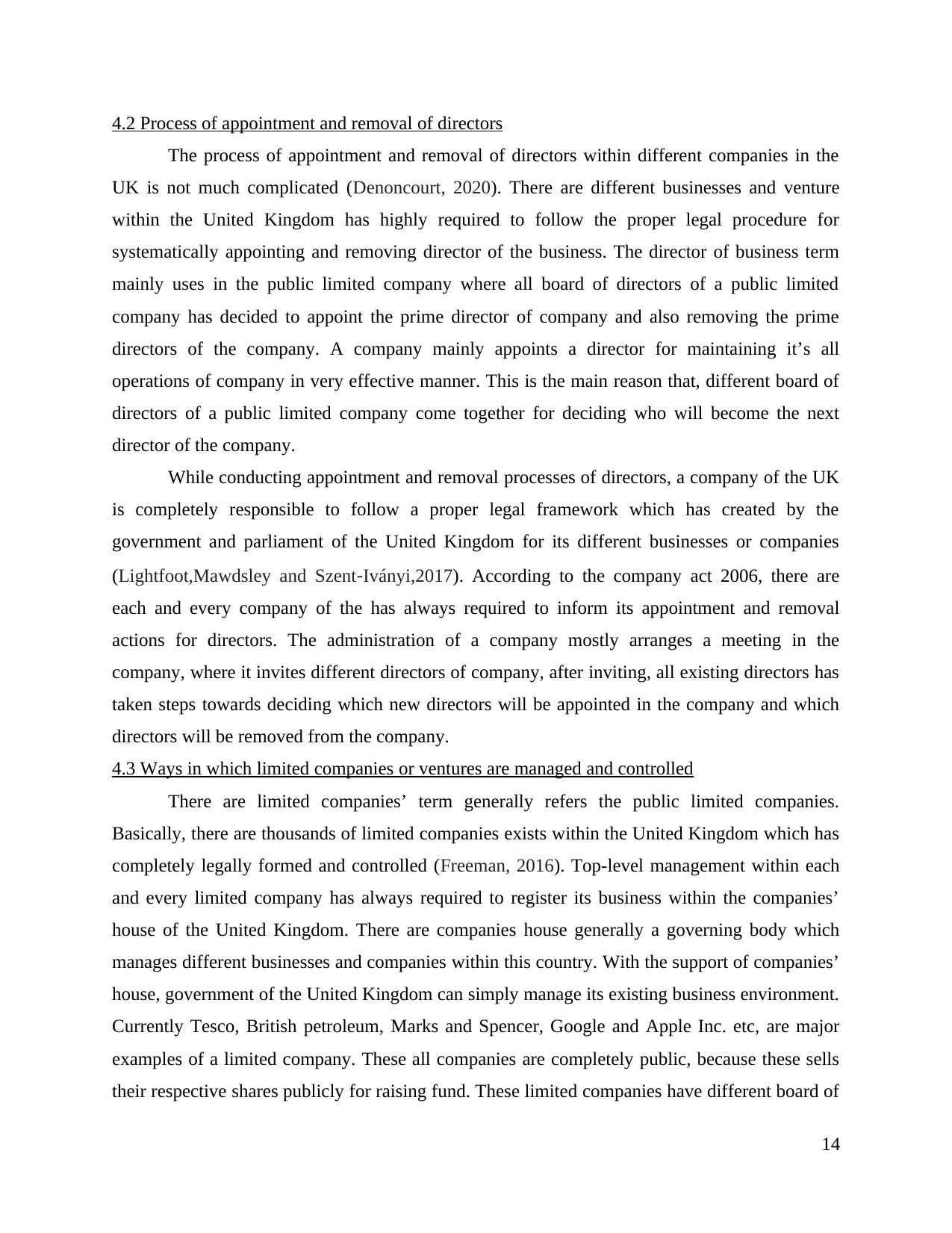
4.2 Process of appointment and removal of directors
The process of appointment and removal of directors within different companies in the
UK is not much complicated (Denoncourt, 2020). There are different businesses and venture
within the United Kingdom has highly required to follow the proper legal procedure for
systematically appointing and removing director of the business. The director of business term
mainly uses in the public limited company where all board of directors of a public limited
company has decided to appoint the prime director of company and also removing the prime
directors of the company. A company mainly appoints a director for maintaining it’s all
operations of company in very effective manner. This is the main reason that, different board of
directors of a public limited company come together for deciding who will become the next
director of the company.
While conducting appointment and removal processes of directors, a company of the UK
is completely responsible to follow a proper legal framework which has created by the
government and parliament of the United Kingdom for its different businesses or companies
(Lightfoot,Mawdsley and Szent‐Iványi,2017). According to the company act 2006, there are
each and every company of the has always required to inform its appointment and removal
actions for directors. The administration of a company mostly arranges a meeting in the
company, where it invites different directors of company, after inviting, all existing directors has
taken steps towards deciding which new directors will be appointed in the company and which
directors will be removed from the company.
4.3 Ways in which limited companies or ventures are managed and controlled
There are limited companies’ term generally refers the public limited companies.
Basically, there are thousands of limited companies exists within the United Kingdom which has
completely legally formed and controlled (Freeman, 2016). Top-level management within each
and every limited company has always required to register its business within the companies’
house of the United Kingdom. There are companies house generally a governing body which
manages different businesses and companies within this country. With the support of companies’
house, government of the United Kingdom can simply manage its existing business environment.
Currently Tesco, British petroleum, Marks and Spencer, Google and Apple Inc. etc, are major
examples of a limited company. These all companies are completely public, because these sells
their respective shares publicly for raising fund. These limited companies have different board of
14
The process of appointment and removal of directors within different companies in the
UK is not much complicated (Denoncourt, 2020). There are different businesses and venture
within the United Kingdom has highly required to follow the proper legal procedure for
systematically appointing and removing director of the business. The director of business term
mainly uses in the public limited company where all board of directors of a public limited
company has decided to appoint the prime director of company and also removing the prime
directors of the company. A company mainly appoints a director for maintaining it’s all
operations of company in very effective manner. This is the main reason that, different board of
directors of a public limited company come together for deciding who will become the next
director of the company.
While conducting appointment and removal processes of directors, a company of the UK
is completely responsible to follow a proper legal framework which has created by the
government and parliament of the United Kingdom for its different businesses or companies
(Lightfoot,Mawdsley and Szent‐Iványi,2017). According to the company act 2006, there are
each and every company of the has always required to inform its appointment and removal
actions for directors. The administration of a company mostly arranges a meeting in the
company, where it invites different directors of company, after inviting, all existing directors has
taken steps towards deciding which new directors will be appointed in the company and which
directors will be removed from the company.
4.3 Ways in which limited companies or ventures are managed and controlled
There are limited companies’ term generally refers the public limited companies.
Basically, there are thousands of limited companies exists within the United Kingdom which has
completely legally formed and controlled (Freeman, 2016). Top-level management within each
and every limited company has always required to register its business within the companies’
house of the United Kingdom. There are companies house generally a governing body which
manages different businesses and companies within this country. With the support of companies’
house, government of the United Kingdom can simply manage its existing business environment.
Currently Tesco, British petroleum, Marks and Spencer, Google and Apple Inc. etc, are major
examples of a limited company. These all companies are completely public, because these sells
their respective shares publicly for raising fund. These limited companies have different board of
14
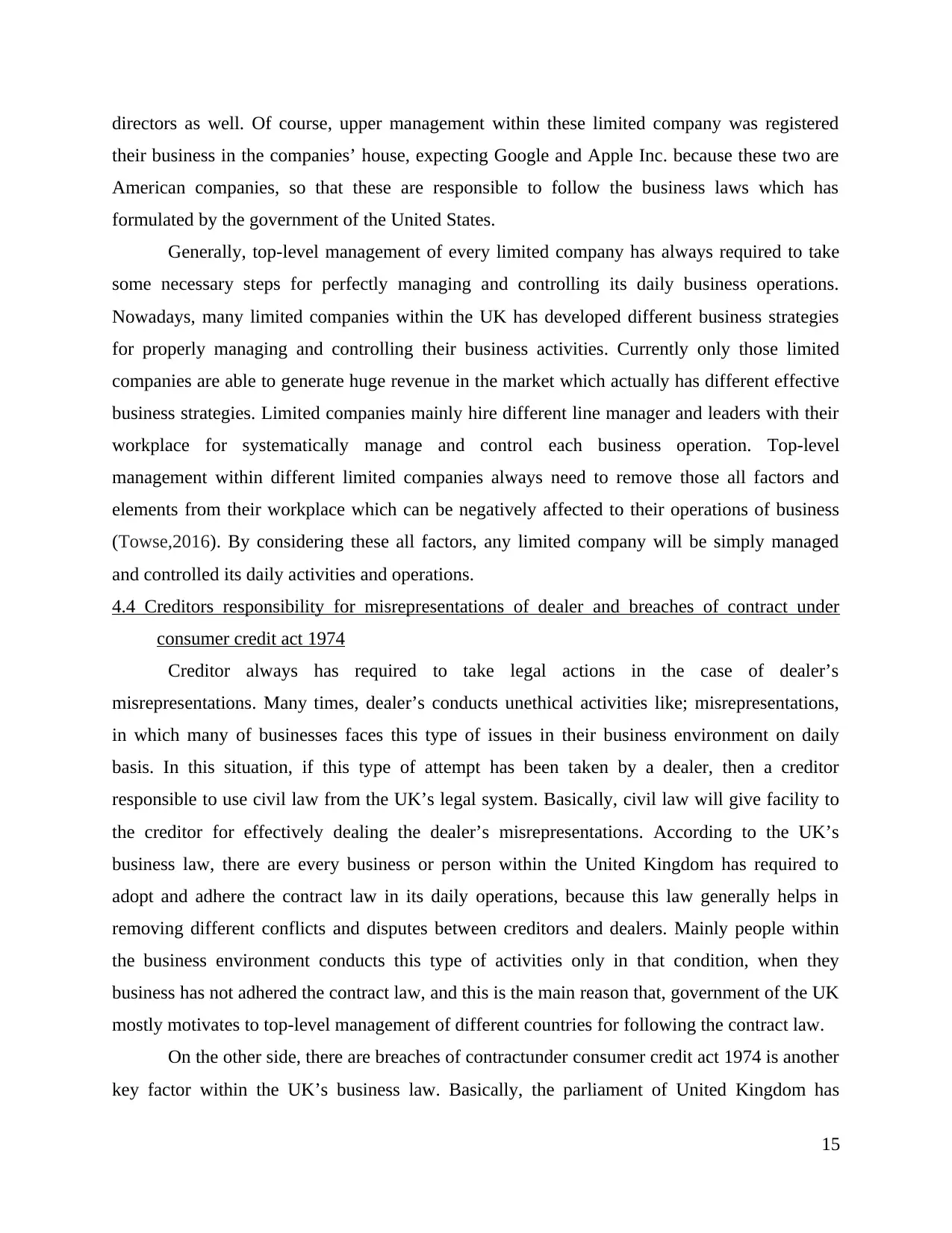
directors as well. Of course, upper management within these limited company was registered
their business in the companies’ house, expecting Google and Apple Inc. because these two are
American companies, so that these are responsible to follow the business laws which has
formulated by the government of the United States.
Generally, top-level management of every limited company has always required to take
some necessary steps for perfectly managing and controlling its daily business operations.
Nowadays, many limited companies within the UK has developed different business strategies
for properly managing and controlling their business activities. Currently only those limited
companies are able to generate huge revenue in the market which actually has different effective
business strategies. Limited companies mainly hire different line manager and leaders with their
workplace for systematically manage and control each business operation. Top-level
management within different limited companies always need to remove those all factors and
elements from their workplace which can be negatively affected to their operations of business
(Towse,2016). By considering these all factors, any limited company will be simply managed
and controlled its daily activities and operations.
4.4 Creditors responsibility for misrepresentations of dealer and breaches of contract under
consumer credit act 1974
Creditor always has required to take legal actions in the case of dealer’s
misrepresentations. Many times, dealer’s conducts unethical activities like; misrepresentations,
in which many of businesses faces this type of issues in their business environment on daily
basis. In this situation, if this type of attempt has been taken by a dealer, then a creditor
responsible to use civil law from the UK’s legal system. Basically, civil law will give facility to
the creditor for effectively dealing the dealer’s misrepresentations. According to the UK’s
business law, there are every business or person within the United Kingdom has required to
adopt and adhere the contract law in its daily operations, because this law generally helps in
removing different conflicts and disputes between creditors and dealers. Mainly people within
the business environment conducts this type of activities only in that condition, when they
business has not adhered the contract law, and this is the main reason that, government of the UK
mostly motivates to top-level management of different countries for following the contract law.
On the other side, there are breaches of contractunder consumer credit act 1974 is another
key factor within the UK’s business law. Basically, the parliament of United Kingdom has
15
their business in the companies’ house, expecting Google and Apple Inc. because these two are
American companies, so that these are responsible to follow the business laws which has
formulated by the government of the United States.
Generally, top-level management of every limited company has always required to take
some necessary steps for perfectly managing and controlling its daily business operations.
Nowadays, many limited companies within the UK has developed different business strategies
for properly managing and controlling their business activities. Currently only those limited
companies are able to generate huge revenue in the market which actually has different effective
business strategies. Limited companies mainly hire different line manager and leaders with their
workplace for systematically manage and control each business operation. Top-level
management within different limited companies always need to remove those all factors and
elements from their workplace which can be negatively affected to their operations of business
(Towse,2016). By considering these all factors, any limited company will be simply managed
and controlled its daily activities and operations.
4.4 Creditors responsibility for misrepresentations of dealer and breaches of contract under
consumer credit act 1974
Creditor always has required to take legal actions in the case of dealer’s
misrepresentations. Many times, dealer’s conducts unethical activities like; misrepresentations,
in which many of businesses faces this type of issues in their business environment on daily
basis. In this situation, if this type of attempt has been taken by a dealer, then a creditor
responsible to use civil law from the UK’s legal system. Basically, civil law will give facility to
the creditor for effectively dealing the dealer’s misrepresentations. According to the UK’s
business law, there are every business or person within the United Kingdom has required to
adopt and adhere the contract law in its daily operations, because this law generally helps in
removing different conflicts and disputes between creditors and dealers. Mainly people within
the business environment conducts this type of activities only in that condition, when they
business has not adhered the contract law, and this is the main reason that, government of the UK
mostly motivates to top-level management of different countries for following the contract law.
On the other side, there are breaches of contractunder consumer credit act 1974 is another
key factor within the UK’s business law. Basically, the parliament of United Kingdom has
15
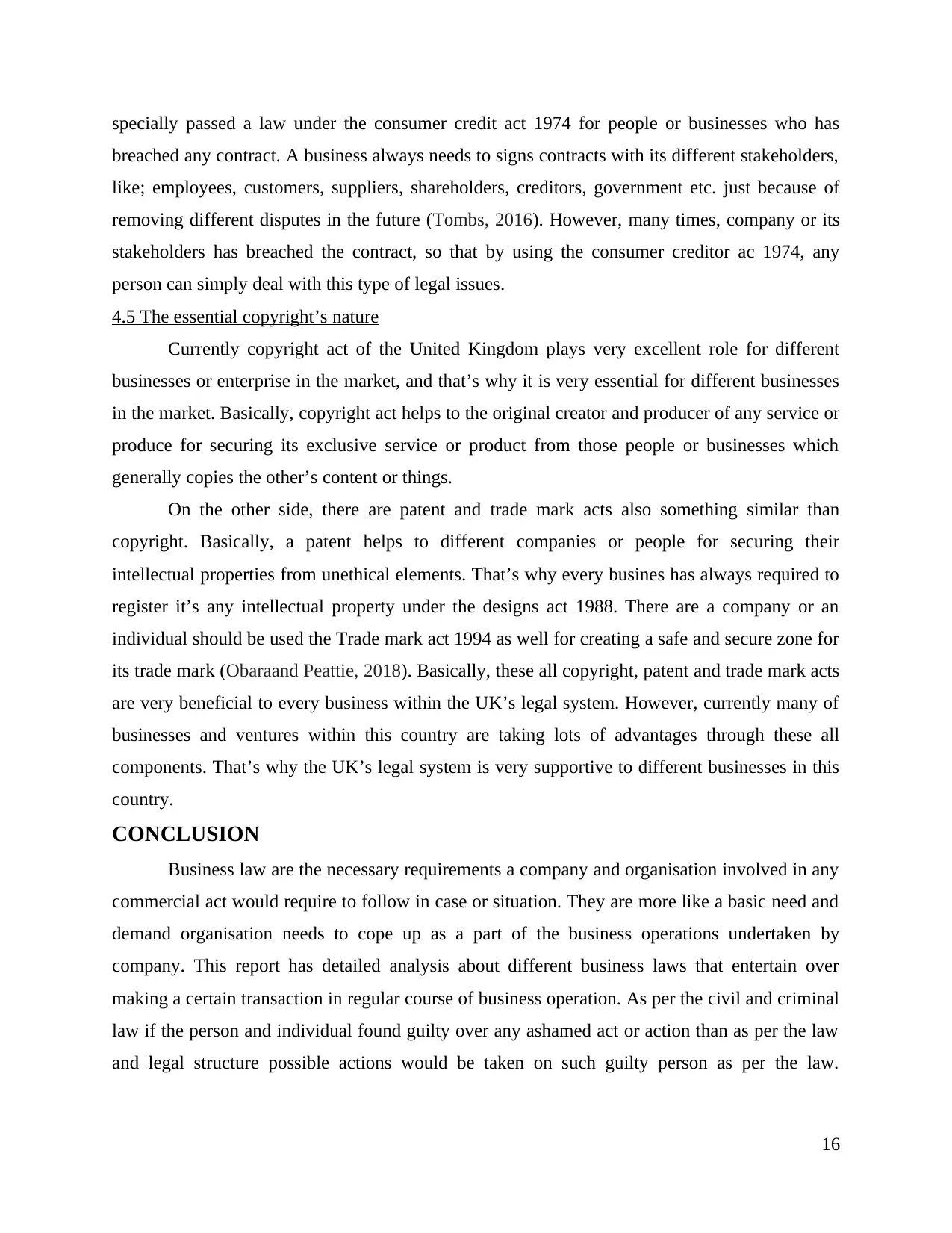
specially passed a law under the consumer credit act 1974 for people or businesses who has
breached any contract. A business always needs to signs contracts with its different stakeholders,
like; employees, customers, suppliers, shareholders, creditors, government etc. just because of
removing different disputes in the future (Tombs, 2016). However, many times, company or its
stakeholders has breached the contract, so that by using the consumer creditor ac 1974, any
person can simply deal with this type of legal issues.
4.5 The essential copyright’s nature
Currently copyright act of the United Kingdom plays very excellent role for different
businesses or enterprise in the market, and that’s why it is very essential for different businesses
in the market. Basically, copyright act helps to the original creator and producer of any service or
produce for securing its exclusive service or product from those people or businesses which
generally copies the other’s content or things.
On the other side, there are patent and trade mark acts also something similar than
copyright. Basically, a patent helps to different companies or people for securing their
intellectual properties from unethical elements. That’s why every busines has always required to
register it’s any intellectual property under the designs act 1988. There are a company or an
individual should be used the Trade mark act 1994 as well for creating a safe and secure zone for
its trade mark (Obaraand Peattie, 2018). Basically, these all copyright, patent and trade mark acts
are very beneficial to every business within the UK’s legal system. However, currently many of
businesses and ventures within this country are taking lots of advantages through these all
components. That’s why the UK’s legal system is very supportive to different businesses in this
country.
CONCLUSION
Business law are the necessary requirements a company and organisation involved in any
commercial act would require to follow in case or situation. They are more like a basic need and
demand organisation needs to cope up as a part of the business operations undertaken by
company. This report has detailed analysis about different business laws that entertain over
making a certain transaction in regular course of business operation. As per the civil and criminal
law if the person and individual found guilty over any ashamed act or action than as per the law
and legal structure possible actions would be taken on such guilty person as per the law.
16
breached any contract. A business always needs to signs contracts with its different stakeholders,
like; employees, customers, suppliers, shareholders, creditors, government etc. just because of
removing different disputes in the future (Tombs, 2016). However, many times, company or its
stakeholders has breached the contract, so that by using the consumer creditor ac 1974, any
person can simply deal with this type of legal issues.
4.5 The essential copyright’s nature
Currently copyright act of the United Kingdom plays very excellent role for different
businesses or enterprise in the market, and that’s why it is very essential for different businesses
in the market. Basically, copyright act helps to the original creator and producer of any service or
produce for securing its exclusive service or product from those people or businesses which
generally copies the other’s content or things.
On the other side, there are patent and trade mark acts also something similar than
copyright. Basically, a patent helps to different companies or people for securing their
intellectual properties from unethical elements. That’s why every busines has always required to
register it’s any intellectual property under the designs act 1988. There are a company or an
individual should be used the Trade mark act 1994 as well for creating a safe and secure zone for
its trade mark (Obaraand Peattie, 2018). Basically, these all copyright, patent and trade mark acts
are very beneficial to every business within the UK’s legal system. However, currently many of
businesses and ventures within this country are taking lots of advantages through these all
components. That’s why the UK’s legal system is very supportive to different businesses in this
country.
CONCLUSION
Business law are the necessary requirements a company and organisation involved in any
commercial act would require to follow in case or situation. They are more like a basic need and
demand organisation needs to cope up as a part of the business operations undertaken by
company. This report has detailed analysis about different business laws that entertain over
making a certain transaction in regular course of business operation. As per the civil and criminal
law if the person and individual found guilty over any ashamed act or action than as per the law
and legal structure possible actions would be taken on such guilty person as per the law.
16
Secure Best Marks with AI Grader
Need help grading? Try our AI Grader for instant feedback on your assignments.
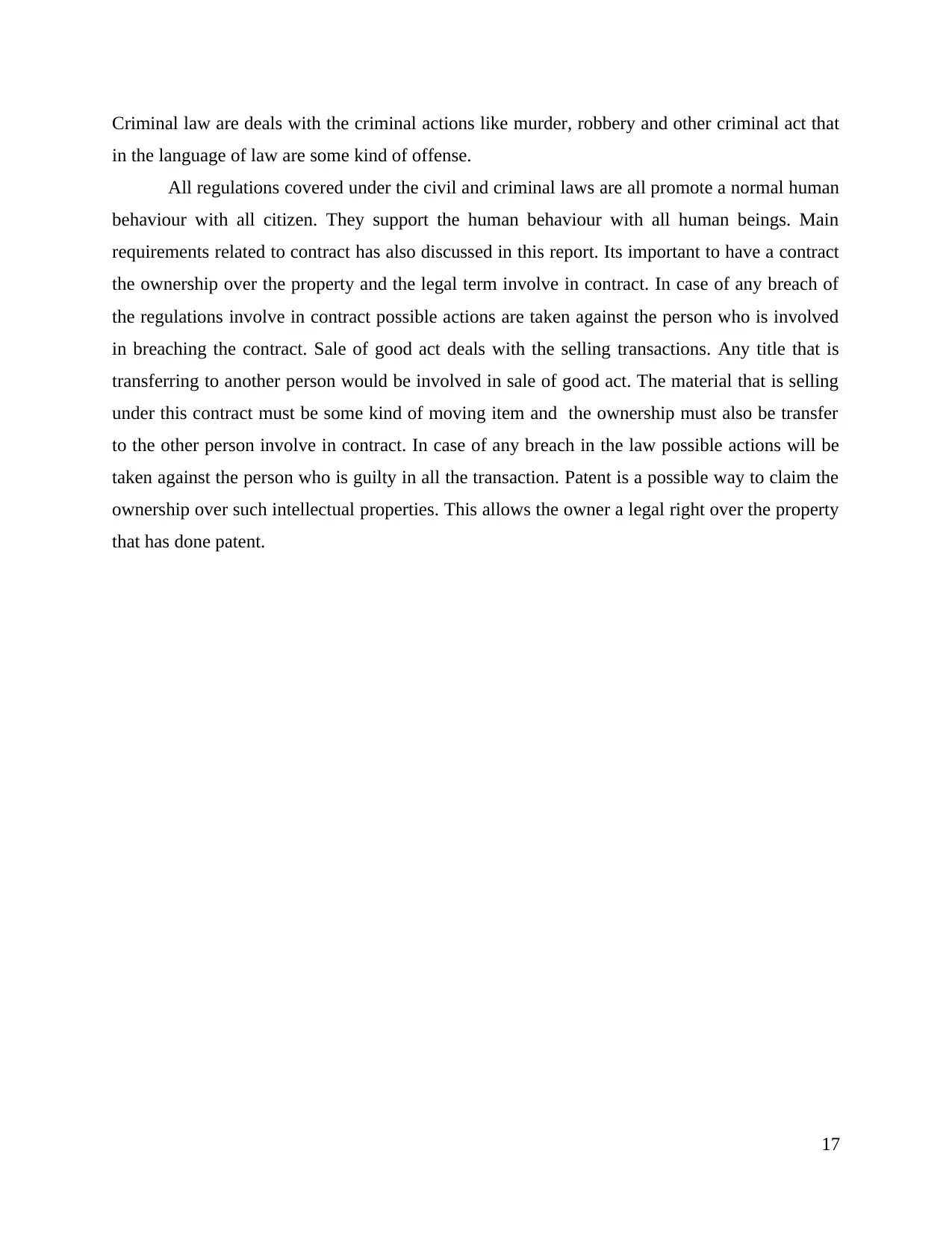
Criminal law are deals with the criminal actions like murder, robbery and other criminal act that
in the language of law are some kind of offense.
All regulations covered under the civil and criminal laws are all promote a normal human
behaviour with all citizen. They support the human behaviour with all human beings. Main
requirements related to contract has also discussed in this report. Its important to have a contract
the ownership over the property and the legal term involve in contract. In case of any breach of
the regulations involve in contract possible actions are taken against the person who is involved
in breaching the contract. Sale of good act deals with the selling transactions. Any title that is
transferring to another person would be involved in sale of good act. The material that is selling
under this contract must be some kind of moving item and the ownership must also be transfer
to the other person involve in contract. In case of any breach in the law possible actions will be
taken against the person who is guilty in all the transaction. Patent is a possible way to claim the
ownership over such intellectual properties. This allows the owner a legal right over the property
that has done patent.
17
in the language of law are some kind of offense.
All regulations covered under the civil and criminal laws are all promote a normal human
behaviour with all citizen. They support the human behaviour with all human beings. Main
requirements related to contract has also discussed in this report. Its important to have a contract
the ownership over the property and the legal term involve in contract. In case of any breach of
the regulations involve in contract possible actions are taken against the person who is involved
in breaching the contract. Sale of good act deals with the selling transactions. Any title that is
transferring to another person would be involved in sale of good act. The material that is selling
under this contract must be some kind of moving item and the ownership must also be transfer
to the other person involve in contract. In case of any breach in the law possible actions will be
taken against the person who is guilty in all the transaction. Patent is a possible way to claim the
ownership over such intellectual properties. This allows the owner a legal right over the property
that has done patent.
17
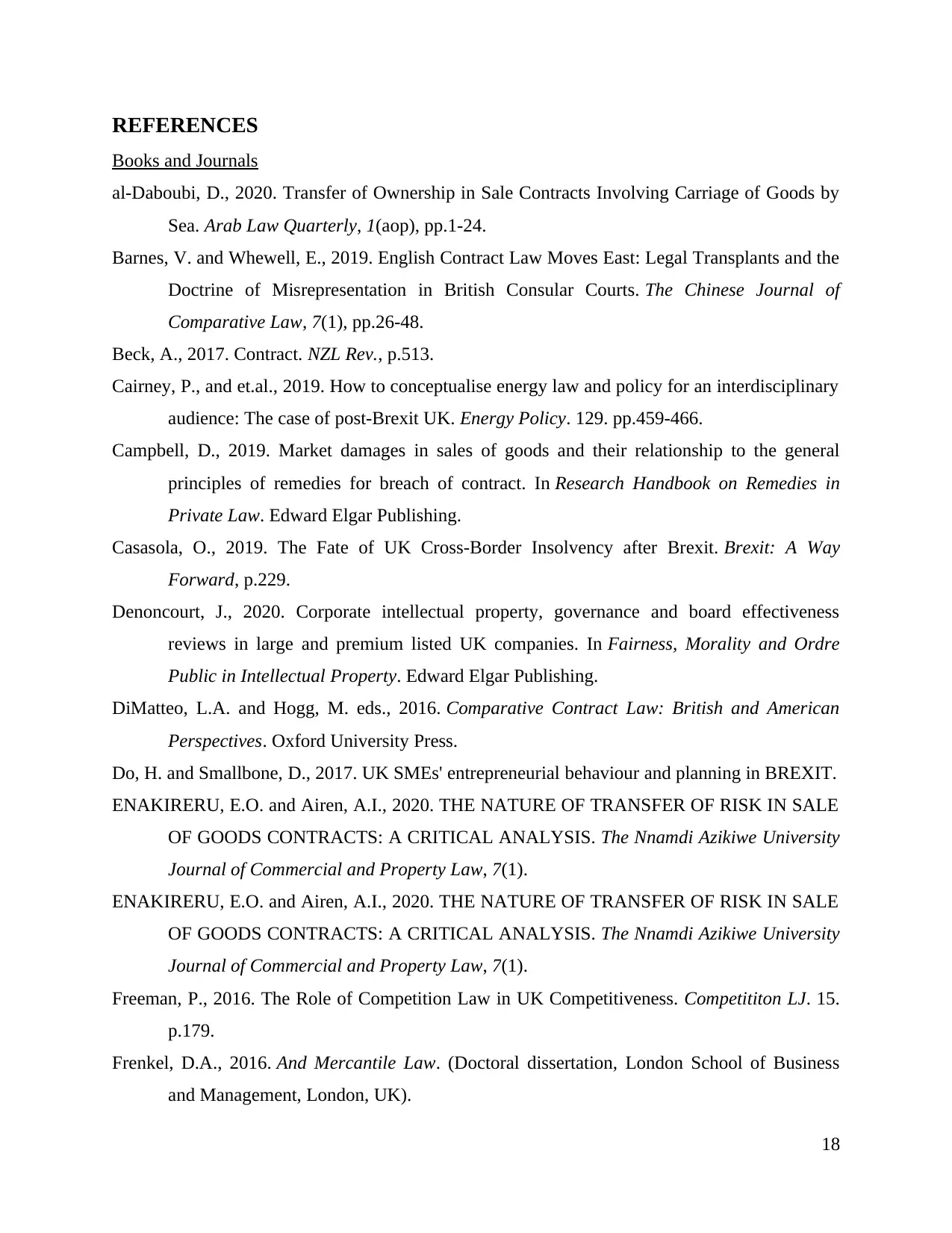
REFERENCES
Books and Journals
al-Daboubi, D., 2020. Transfer of Ownership in Sale Contracts Involving Carriage of Goods by
Sea. Arab Law Quarterly, 1(aop), pp.1-24.
Barnes, V. and Whewell, E., 2019. English Contract Law Moves East: Legal Transplants and the
Doctrine of Misrepresentation in British Consular Courts. The Chinese Journal of
Comparative Law, 7(1), pp.26-48.
Beck, A., 2017. Contract. NZL Rev., p.513.
Cairney, P., and et.al., 2019. How to conceptualise energy law and policy for an interdisciplinary
audience: The case of post-Brexit UK. Energy Policy. 129. pp.459-466.
Campbell, D., 2019. Market damages in sales of goods and their relationship to the general
principles of remedies for breach of contract. In Research Handbook on Remedies in
Private Law. Edward Elgar Publishing.
Casasola, O., 2019. The Fate of UK Cross-Border Insolvency after Brexit. Brexit: A Way
Forward, p.229.
Denoncourt, J., 2020. Corporate intellectual property, governance and board effectiveness
reviews in large and premium listed UK companies. In Fairness, Morality and Ordre
Public in Intellectual Property. Edward Elgar Publishing.
DiMatteo, L.A. and Hogg, M. eds., 2016. Comparative Contract Law: British and American
Perspectives. Oxford University Press.
Do, H. and Smallbone, D., 2017. UK SMEs' entrepreneurial behaviour and planning in BREXIT.
ENAKIRERU, E.O. and Airen, A.I., 2020. THE NATURE OF TRANSFER OF RISK IN SALE
OF GOODS CONTRACTS: A CRITICAL ANALYSIS. The Nnamdi Azikiwe University
Journal of Commercial and Property Law, 7(1).
ENAKIRERU, E.O. and Airen, A.I., 2020. THE NATURE OF TRANSFER OF RISK IN SALE
OF GOODS CONTRACTS: A CRITICAL ANALYSIS. The Nnamdi Azikiwe University
Journal of Commercial and Property Law, 7(1).
Freeman, P., 2016. The Role of Competition Law in UK Competitiveness. Competititon LJ. 15.
p.179.
Frenkel, D.A., 2016. And Mercantile Law. (Doctoral dissertation, London School of Business
and Management, London, UK).
18
Books and Journals
al-Daboubi, D., 2020. Transfer of Ownership in Sale Contracts Involving Carriage of Goods by
Sea. Arab Law Quarterly, 1(aop), pp.1-24.
Barnes, V. and Whewell, E., 2019. English Contract Law Moves East: Legal Transplants and the
Doctrine of Misrepresentation in British Consular Courts. The Chinese Journal of
Comparative Law, 7(1), pp.26-48.
Beck, A., 2017. Contract. NZL Rev., p.513.
Cairney, P., and et.al., 2019. How to conceptualise energy law and policy for an interdisciplinary
audience: The case of post-Brexit UK. Energy Policy. 129. pp.459-466.
Campbell, D., 2019. Market damages in sales of goods and their relationship to the general
principles of remedies for breach of contract. In Research Handbook on Remedies in
Private Law. Edward Elgar Publishing.
Casasola, O., 2019. The Fate of UK Cross-Border Insolvency after Brexit. Brexit: A Way
Forward, p.229.
Denoncourt, J., 2020. Corporate intellectual property, governance and board effectiveness
reviews in large and premium listed UK companies. In Fairness, Morality and Ordre
Public in Intellectual Property. Edward Elgar Publishing.
DiMatteo, L.A. and Hogg, M. eds., 2016. Comparative Contract Law: British and American
Perspectives. Oxford University Press.
Do, H. and Smallbone, D., 2017. UK SMEs' entrepreneurial behaviour and planning in BREXIT.
ENAKIRERU, E.O. and Airen, A.I., 2020. THE NATURE OF TRANSFER OF RISK IN SALE
OF GOODS CONTRACTS: A CRITICAL ANALYSIS. The Nnamdi Azikiwe University
Journal of Commercial and Property Law, 7(1).
ENAKIRERU, E.O. and Airen, A.I., 2020. THE NATURE OF TRANSFER OF RISK IN SALE
OF GOODS CONTRACTS: A CRITICAL ANALYSIS. The Nnamdi Azikiwe University
Journal of Commercial and Property Law, 7(1).
Freeman, P., 2016. The Role of Competition Law in UK Competitiveness. Competititon LJ. 15.
p.179.
Frenkel, D.A., 2016. And Mercantile Law. (Doctoral dissertation, London School of Business
and Management, London, UK).
18
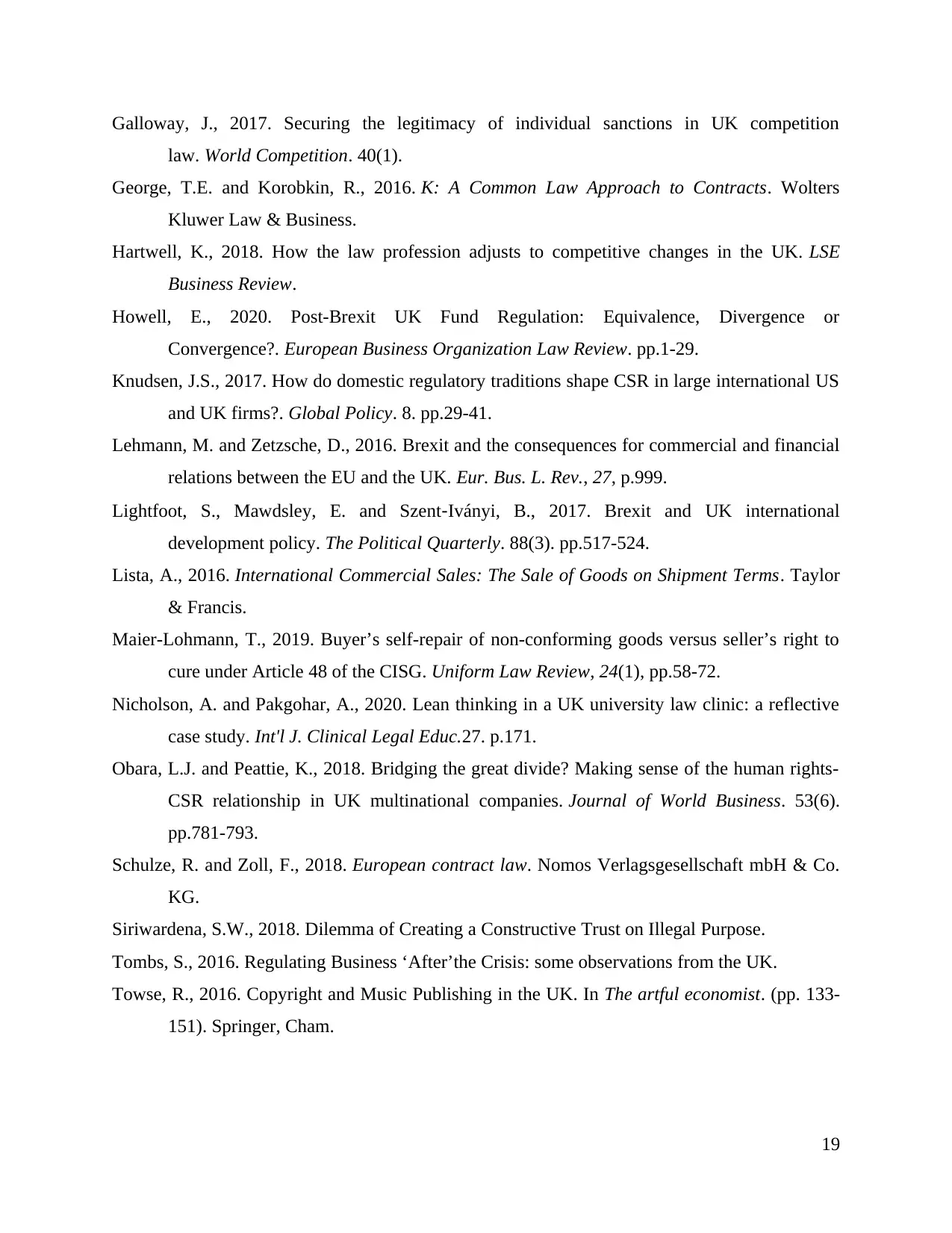
Galloway, J., 2017. Securing the legitimacy of individual sanctions in UK competition
law. World Competition. 40(1).
George, T.E. and Korobkin, R., 2016. K: A Common Law Approach to Contracts. Wolters
Kluwer Law & Business.
Hartwell, K., 2018. How the law profession adjusts to competitive changes in the UK. LSE
Business Review.
Howell, E., 2020. Post-Brexit UK Fund Regulation: Equivalence, Divergence or
Convergence?. European Business Organization Law Review. pp.1-29.
Knudsen, J.S., 2017. How do domestic regulatory traditions shape CSR in large international US
and UK firms?. Global Policy. 8. pp.29-41.
Lehmann, M. and Zetzsche, D., 2016. Brexit and the consequences for commercial and financial
relations between the EU and the UK. Eur. Bus. L. Rev., 27, p.999.
Lightfoot, S., Mawdsley, E. and Szent‐Iványi, B., 2017. Brexit and UK international
development policy. The Political Quarterly. 88(3). pp.517-524.
Lista, A., 2016. International Commercial Sales: The Sale of Goods on Shipment Terms. Taylor
& Francis.
Maier-Lohmann, T., 2019. Buyer’s self-repair of non-conforming goods versus seller’s right to
cure under Article 48 of the CISG. Uniform Law Review, 24(1), pp.58-72.
Nicholson, A. and Pakgohar, A., 2020. Lean thinking in a UK university law clinic: a reflective
case study. Int'l J. Clinical Legal Educ.27. p.171.
Obara, L.J. and Peattie, K., 2018. Bridging the great divide? Making sense of the human rights-
CSR relationship in UK multinational companies. Journal of World Business. 53(6).
pp.781-793.
Schulze, R. and Zoll, F., 2018. European contract law. Nomos Verlagsgesellschaft mbH & Co.
KG.
Siriwardena, S.W., 2018. Dilemma of Creating a Constructive Trust on Illegal Purpose.
Tombs, S., 2016. Regulating Business ‘After’the Crisis: some observations from the UK.
Towse, R., 2016. Copyright and Music Publishing in the UK. In The artful economist. (pp. 133-
151). Springer, Cham.
19
law. World Competition. 40(1).
George, T.E. and Korobkin, R., 2016. K: A Common Law Approach to Contracts. Wolters
Kluwer Law & Business.
Hartwell, K., 2018. How the law profession adjusts to competitive changes in the UK. LSE
Business Review.
Howell, E., 2020. Post-Brexit UK Fund Regulation: Equivalence, Divergence or
Convergence?. European Business Organization Law Review. pp.1-29.
Knudsen, J.S., 2017. How do domestic regulatory traditions shape CSR in large international US
and UK firms?. Global Policy. 8. pp.29-41.
Lehmann, M. and Zetzsche, D., 2016. Brexit and the consequences for commercial and financial
relations between the EU and the UK. Eur. Bus. L. Rev., 27, p.999.
Lightfoot, S., Mawdsley, E. and Szent‐Iványi, B., 2017. Brexit and UK international
development policy. The Political Quarterly. 88(3). pp.517-524.
Lista, A., 2016. International Commercial Sales: The Sale of Goods on Shipment Terms. Taylor
& Francis.
Maier-Lohmann, T., 2019. Buyer’s self-repair of non-conforming goods versus seller’s right to
cure under Article 48 of the CISG. Uniform Law Review, 24(1), pp.58-72.
Nicholson, A. and Pakgohar, A., 2020. Lean thinking in a UK university law clinic: a reflective
case study. Int'l J. Clinical Legal Educ.27. p.171.
Obara, L.J. and Peattie, K., 2018. Bridging the great divide? Making sense of the human rights-
CSR relationship in UK multinational companies. Journal of World Business. 53(6).
pp.781-793.
Schulze, R. and Zoll, F., 2018. European contract law. Nomos Verlagsgesellschaft mbH & Co.
KG.
Siriwardena, S.W., 2018. Dilemma of Creating a Constructive Trust on Illegal Purpose.
Tombs, S., 2016. Regulating Business ‘After’the Crisis: some observations from the UK.
Towse, R., 2016. Copyright and Music Publishing in the UK. In The artful economist. (pp. 133-
151). Springer, Cham.
19
Paraphrase This Document
Need a fresh take? Get an instant paraphrase of this document with our AI Paraphraser
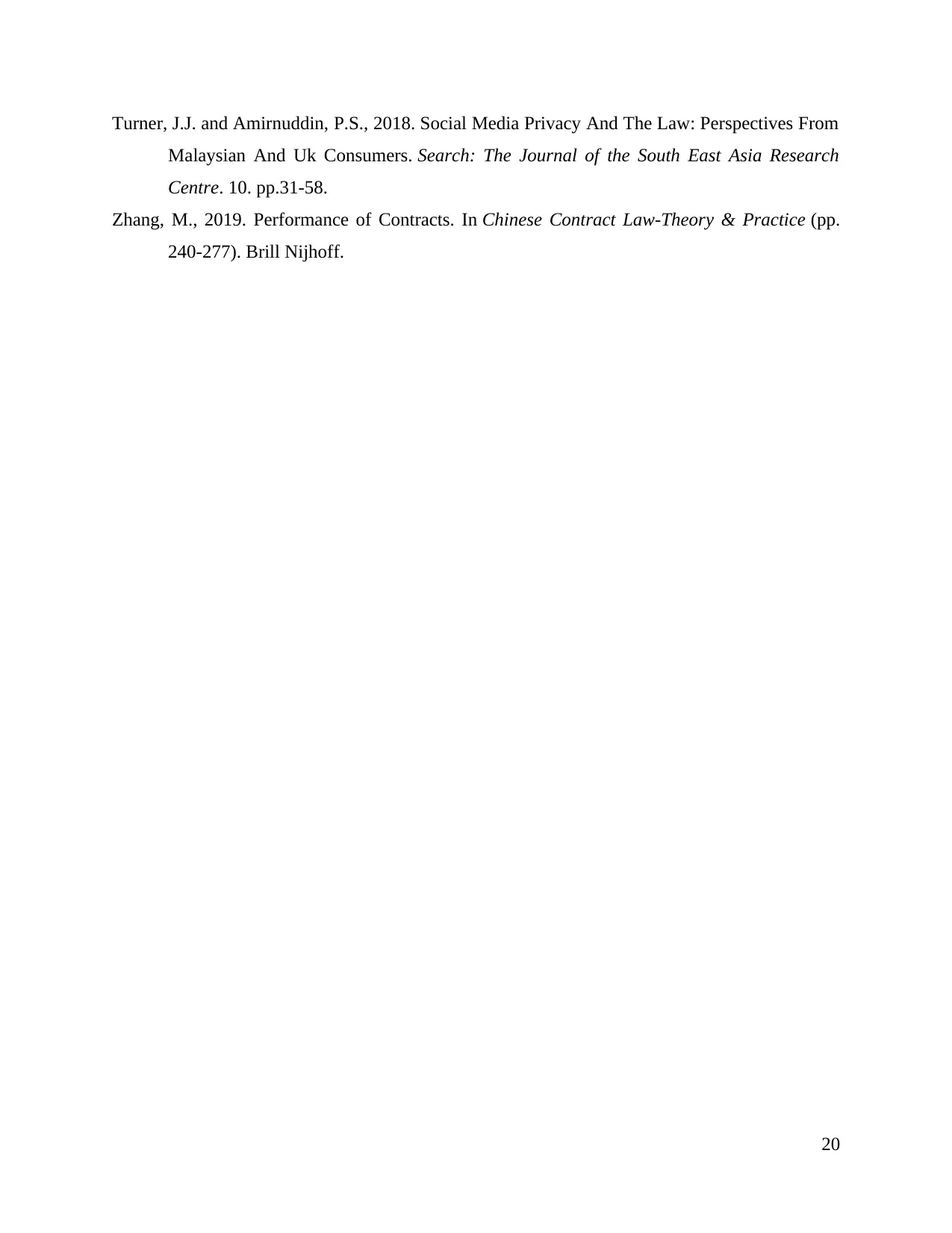
Turner, J.J. and Amirnuddin, P.S., 2018. Social Media Privacy And The Law: Perspectives From
Malaysian And Uk Consumers. Search: The Journal of the South East Asia Research
Centre. 10. pp.31-58.
Zhang, M., 2019. Performance of Contracts. In Chinese Contract Law-Theory & Practice (pp.
240-277). Brill Nijhoff.
20
Malaysian And Uk Consumers. Search: The Journal of the South East Asia Research
Centre. 10. pp.31-58.
Zhang, M., 2019. Performance of Contracts. In Chinese Contract Law-Theory & Practice (pp.
240-277). Brill Nijhoff.
20
1 out of 20
Related Documents
Your All-in-One AI-Powered Toolkit for Academic Success.
+13062052269
info@desklib.com
Available 24*7 on WhatsApp / Email
![[object Object]](/_next/static/media/star-bottom.7253800d.svg)
Unlock your academic potential
© 2024 | Zucol Services PVT LTD | All rights reserved.





